
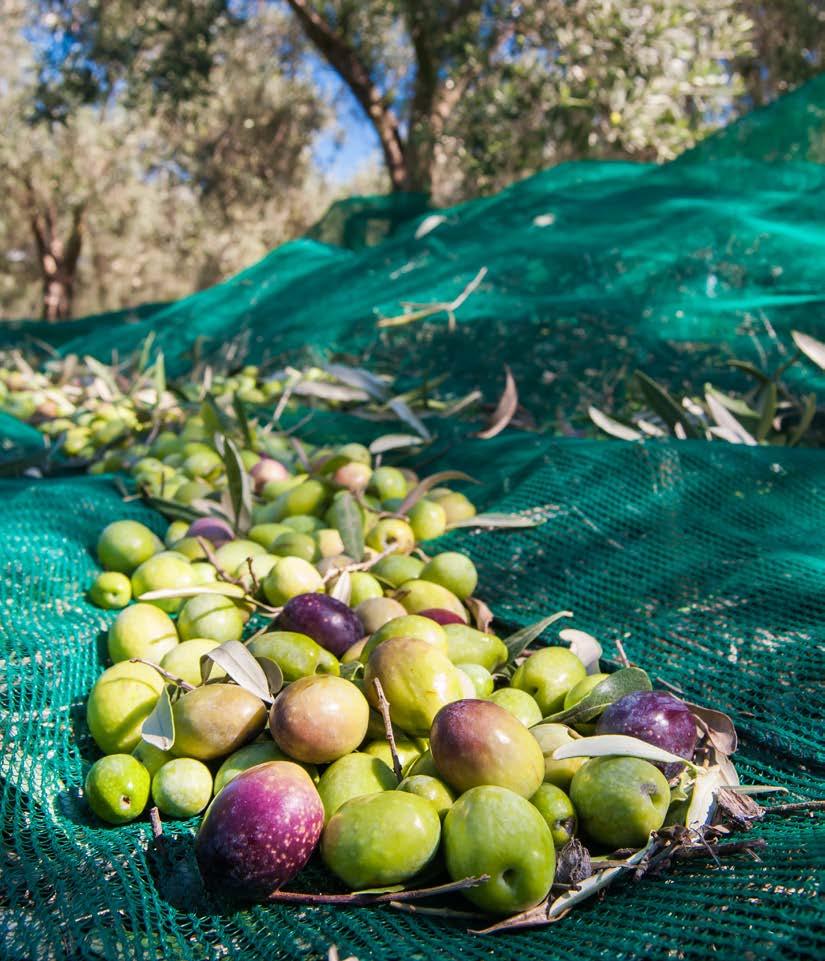
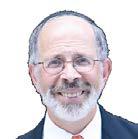


ISSUE 1505 FEB 18TH '23 ג"פשת טבש ז"כ PARSHAT MISHPATIM - PARSHAT SHEKALIM SHABBAT MEVARCHIM ה"ב OU ISRAEL 02-560-9100 | TorahTidbits.com | ADVERTISING 02- 560-9125 םיטפשמ תשרפ YERUSHALAYIM IN/OUT TIMES FOR SHABBAT PARSHAT MISHPATIM CANDLES 4:51PM • HAVDALA 6:05PM • RABBEINU TAM 6:45PM תישאר ירוכב ךתמדא איבת 'ה תיב טי:גכ תומש Ad D’lo Yada…Madua? Rabbi Shmuel Goldin Faculty, OU Israel page 16 Dive In! Rabbi Judah Mischel Mashpiah, OU-NCSY page 34
04Dear Torah Tidbits Family
52Mishpatim: The Renewed Covenant
Rabbi Moshe Taragin
56Haftorah Insights
Rebbetzin Dr. Adina Shmidman
58Every Mitzvah Embedded in the Land Rabbi Aaron Goldscheider
62Making Up a Tefilla Missed to Help the Sick Rabbi Daniel Mann
64Shemitah Wine and Grape Juice – Otzar Beit Din of Rabbi Nissim Karelitz Rabbi Moshe Bloom
66On Unity, Working as an Emissary, and the Power of Women Sivan Rahav Meir
Probing The Prophets
Rabbi Nachman Winkler
68Conclusion of Birchat HaMazon
Rebbetzin Zemira Ozarowski
70Preventing Mistakes
Rabbi Gideon Weitzman
72The Y- Files Weekly Comic Netanel Epstein
74From The Ha’amek Davar
Dr. Jacob Solomon
76OU-JLIC Benjamin Zatman
78Torah 4 Teens By Teens Rose Schwartz// Aliyah Derfler
2 TORAH TIDBITS 1505 / MISHPATIM 5783 HELPFUL REMINDERS: Shabbat Mevarchim - Adar תוצח ירחא םיקלח רשע דחאו תוקד םיעברא ,ינש םויב היהי דלומה הבוטל לארשי לכ לעו ונילע אבה יעיבר םויבו ישילש םויב היהי רדא שדח שאר Rosh Chodesh Adar is on Tuesday, February 21 and Wednesday February 22 Torah Reading
Shabbat
read
Sifrei Torah.
Ki Tisa
30:11)
Shekalim. Table of Contents
This
we
from two
The second reading is
(Shemot
for parshat
Rabbi Avi Berman 08The Power to Serve Rabbi Moshe Hauer 10Aliya By Aliya Sedra Summary Rabbi Reuven Tradburks
Ad D’lo Yada…Madua? Rabbi Shmuel Goldin 18The Many Lessons of ‘Half’ Rabbi Dr. Tzvi Hersh Weinreb
Doing and Hearing Rabbi Lord Jonathan Sacks zt"l
16
22
26
28
Rabbi
Rosner 32Mishpatim Metamorphosis Rebbetzin Shira Smiles 34Dive In! Rabbi Judah Mischel 40OU Israel Schedule 50Simchat Shmuel
Serving as a Proper Guardian
Shalom
Rabbi Sam Shor
CANDLE LIGHTING
AND HAVDALA TIMES
OTHER Z'MANIM
JERUSALEM
Ranges 11 days Wed - Shabbat
Feb. 15-25 / 24 Shevat - 4 Adar
Earliest Tallit and Tefillin
- 5:20
Sunrise 6:21 - 6:11
Sof Zman Kriat Shema 9:07- 9:02
Magen Avraham 8:31 - 8:25
Sof Zman Tefila 10:02 - 9:58
(According to the Gra and Baal HaTanya)
Chatzot (Halachic Noon) 11:53- 11:52
Mincha Gedola (Earliest Mincha) 12:23 - 12:22
Plag Mincha 4:16 - 4:22
Sunset (Including Elevation) 5:30 - 5:38
Seymour J. Abrams • Orthodox Union Jerusalem World Center • Avrom Silver Jerusalem College for Adults • Wolinetz Family Shul • Makom BaLev • Birthright • Yachad • NCSY in Israel • JLIC in Israel • Pearl & Harold M. Jacobs ZULA Outreach Center • The Jack Gindi Oraita Program • OU Israel Kashrut
STUART HERSHKOWITZ, PRESIDENT OU ISRAEL
Zvi Sand / Yitzchak Fund: Former Presidents, OU Israel

| Rabbi Emanuel Quint z”l, Senior Vice President | Prof. Meni Koslowsky, Vice President
VAAD MEMBERS:
Dr. Michael Elman | Moshe Kempinski | Sandy Kestenbaum | Norman Shmutter | Esther Williams | Harvey Wolinetz

RABBI AVI BERMAN, EXECUTIVE DIRECTOR, OU ISRAEL
TImes According to MyZmanim (20 min. before sundown in most cities, 40 min. in Yerushalyim and Petach Tikva, 30 min. in Tzfat/Haifa)
OU Kashrut NCSY Jewish Action JLIC NJCD / Yachad / Our Way OU West Coast OU Press Synagogue/Community Services OU Advocacy OU Israel
MITCHEL R. AEDER, PRESIDENT OF THE ORTHODOX UNION Yehuda Neuberger, Chairman of the Board, Orthodox Union | Dr. Josh Penn, OU Kashrus Commission

RABBI MOSHE HAUER, EXECUTIVE VICE PRESIDENT | RABBI JOSHUA M. JOSEPH, ED.D. EXECUTIVE VICE PRESIDENT & CHIEF OPERATING OFFICER
Rabbi Dr. Tzvi Hersh Weinreb, Exec. V.P. Emeritus
OU KOSHER: Rabbi Menachem Genack, CEO/Rabbinic Administrator OU Kosher | Rabbi Moshe Elefant, COO/Executive Rabbinic Coordinator ISRAEL: Rabbi Yissachar Dov Krakowski, Rabbinic Administrator | Rabbi Ezra Friedman, The Gustave & Carol Jacobs Center for Kashrut Education/Rabbinic Field Representative
Headquarters: 40 Rector St. 4th floor, New York, NY 10006 212-563-4000 website: www.ou.org
Editor Emeritus: Phil Chernofsky
Editor: Rabbi Aaron Goldscheider | aarong@ouisrael.org
Advertising: Ita Rochel | 02-5609125 or ttads@ouisrael.org
Website: www.torahtidbits.com
Not getting enough TTs? Too many? None at all?
Contact our DISTRIBUTION 050-577-2111 • ttdist@ouisrael.org
David Katz, CFO, OU Israel | Chaim Pelzner, Director of Programs, OU Israel | Rabbi Sam Shor, Director of Programs, OU Israel Center Rabbi Sholom Gold, Dean, Avrom Silver Jerusalem College for Adults
22 Keren HaYesod <> POB 37015 <> Jerusalem 91370
phone: (02) 560 9100 | fax: (02) 561-7432
email: office@ouisrael.org
website: www.ouisrael.org
Founders and initial benefactors of the OU Israel Center: George and Ilse Falk a"h
Torah Tidbits and many of the projects of OU Israel are assisted by grants from THE JERUSALEM MUNICIPALITY
OU Israel, Torah Tidbits does not endorse the political or halachic positions of its editor, columnists or advertisers, nor guarantee the quality of advertised services or products. Nor do we endorse the kashrut of hotels, restaurants, caterers or food products that are advertised in TT (except, of course, those under OU-Israel hashgacha). Any "promises" made in ads are the sole responsibility of the advertisers and not that of OU Israel, the OU Israel Center , Torah Tidbits.
OU ISRAEL CENTER 3
5:30
TERUMAH HAVDALA MISHPATIM CANDLES Havdala Candles 6:05 Yerushalayim / Maale Adumim 4:51 6:11 4:57 6:13 5:15 6:08 Aza area (Netivot, S’derot, Et al) 5:09 6:11 5:16 6:06 Beit Shemesh / RBS 5:10 6:11 5:13 6:06 Gush Etzion 5:07 6:12 5:13 6:06 Raanana/ Tel Mond/ Herzliya/ K. Saba 5:07 6:11 5:13 6:06 Modi’in / Chashmona’im 5:07 6:12 5:13 6:06 Netanya 5:07 6:12 5:14 6:07 Be’er Sheva 5:09 6:12 5:14 6:07 Rehovot 5:08 6:12 4:57 6:06 Petach Tikva 4:51 6:11 5:12 6:05 Ginot Shomron 5:07 6:11 5:02 6:05 Haifa / Zichron 4:56 6:10 5:12 6:05 Gush Shiloh 5:06 6:12 5:14 6:07 Tel Aviv / Giv’at Shmuel 5:08 6:11 5:16 6:05 Giv’at Ze’ev 5:11 6:11 5:13 6:06 Chevron / Kiryat Arba 5:07 6:13 5:15 6:08 Ashkelon 5:09 6:12 5:14 6:07 Yad Binyamin 5:08 6:09 5:05 6:03 Tzfat / Bik’at HaYarden 4:59 6:09 5:10 6:03 Golan 5:04 Rabbeinu Tam (J'lem) - 6:45PM • next week - 6:51pm
DEAR TORAH TIDBITS FAMILY
AVI BERMAN Executive Director, OU Israel
Over the past few Shabbatot, Am Yisrael experienced tremendous loss and pain.
Two weeks ago a terrorist murdered seven holy members of Am Yisrael in Neve Yaakov outside their local beit knesset on Friday night. The next morning, a father and son were shot by a terrorist near Ir David on their way home from minyan.
This past Friday, tragedy struck again just hours before Shabbat arrived. Instead of spending the final minutes before Shabbat setting the table and pulling challot out of the oven, the Paley and Lederman families buried their precious loved ones as the neshamot of Yaakov Yisrael Paley HY”D (6-years-old) and Alter Shlomo Lederman HY”D (a newlywed 20-year-old) returned to their Creator following a car ramming attack in Ramot. Within 24-hours, Asher Menachem Paley HY”D (8-years-old) joined his younger brother in the Olam Ha’emet.
As Rav Tzvi Katz said during Alter Shlomo Lederman’s levaya, “God has plucked the
May the Torah learned from this issue be נ"על and in loving memory of Harry Grunstein z"l
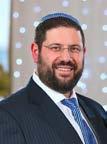
on his 4th yahrzeit רדא
His wife, Tzippy, children and grandchildren, Grunstein, Slelatt and Henryson families
most beautiful lily in the garden.”
This coming week, in shuls around the world, we will say Birkat HaChodesh as we welcome in the month of Adar. With the ache in our hearts we are tasked with bringing the joy and happiness of Adar into our lives - a difficult endeavor to say the least. I’d go as far as to say that Rosh Chodesh Adar is a particularly complex day for those who were impacted by the Yeshivat Mercaz HaRav massacre which took place 15 years ago. With the pain of Am Yisrael weighing on my heart, the tefillah of Birkat HaChodesh gives me both focus and hope.
Condolences to the families of those murdered ד"יה in the terror attack last Friday in Ramot and to the family of the soldier murdered on Monday in the Shuafat checkpoint attack
and for the families of the murdered
4 TORAH TIDBITS 1505 / MISHPATIM 5783
ׁשֵּדַחְּתֶׁש .ּוניֵתובֲא יקלאֵו ּוניקלֱא 'ה ָךיֶנָפְּלִמ ןוצָר יִהְי םיִּיַח ּונָל ןֶּתִתְו .הָכָרְבִלְו הָבוטְל הֶּזַה ׁשֶדחַה תֶא ּוניֵלָע .הָכָרְּב לֶׁש םיִּיַח .הָבוט לֶׁש םיִּיַח .םולָׁש לֶׁש םיִּיַח .םיִּכּורֲא הָבוטְל ּונֵּבִל תולֲאְׁשִמ ּואְלָמִּיֶׁש םיִּיַח …הָסָנְרַּפ לֶׁש םיִּיַח :הָלֶס ןֵמָא .תּורֵחְל תּודְבַעֵמ םָתוא לַאָגְו ּוניֵתובֲאַל םיִּסִנ השָעֶׁש יִמ .ץֶרָאָה תופְנַּכ עַּבְרַאֵמ ּוניֵחָּדִנ ץֵּבַקיִו בורָקְּב ּונָתוא לַאְגִי אּוה
RABBI
ל"ז ןתנוהי השמ ןב ריאמ יבצ
א
םילשוריו ןויצ ילבא ראש ךותב םכתא םחני םוקמה
Shleima
תידוהי ןב חנ םהרבא היח תירוא ןב םייח בדנ
Please join us in davening for a Refuah
for the injured including:
May it be the will before You, HaShem, our God, and the God of our forefathers, that You inaugurate for us this month for goodness and for blessing. May You grant us long life - a life of peace, a life of goodness, a life of blessing, a life of sustenance, a life of physical health… a life in which will be fulfilled the requests of our hearts for the good. Amen, Selah.
The One Who performed miracles for our forefathers and redeemed them from slavery to freedom - may He redeem us soon and gather our dispersed from the four corners of the earth, then comrades will all Israel be. Now let us respond, Amen.
In an effort to find my own sense of clarity during these painful times, I’ll share a perspective on the meaning of simcha in the context of Adar that I have come
Debbie Markowitz
Esther Devora bat Eliezer a"h
The funeral was Motzei Shabbat 21 Shevat
Leonard & Annette Lauer, Elizabeth, NJ
Gershon Markowitz, Har Nof


Naomi Rachael Tub, Pardes Chana

Shifra Steindler, Pardes Chana
Michael Markowitz, Rechovot
Yonatan Markowitz, Beit Nekofa
Elimelech Markowitz, Ramat Eshkol
Sharon Shulman, East Brunswick, NJ
Shiva until Shabbosfor Shiva information, please call 02-6514818







OU ISRAEL CENTER 5 True wholesaler from the diamond boursa with over 25 years experience member diamond dealers club Engagement Rings ∙ Stud Earrings Pendants ∙ Tennis Bracelets 050-573-9061 jeffmor36@gmail.com www.JeffMorDiamondJewelry.com :ןֵמָא רַמאנְו לֵאָרשִי לָּכ םיִרֵבֲח
It is with great sorrow that we announce the sudden passing of our dear daughter, wife, mother, savta and sister
to appreciate. The Gemara (Taanis 29) tells us, “Mishenichnas Adar marbim b’simcha.” This phrase is commonly understood to mean that we should increase our joy during the month of Adar because of the miracles that took place for the Jews of Persia. But what is true simcha (happiness)?
Across Eretz Yisrael there is a palpable buzz in the air once Adar begins. Teachers plan chagigot, families pick mishloach manot themes, and children scout out costumes to wear. I vividly remember the years I spent in yeshivah as a teen during the month of Adar during which we were given permission to prank the school in the spirit of Adar.
But as a parent and educator looking back on that experience I understand that true simcha is a unifying experience that brings joy to everyone involved. Needless to say, I can imagine the agmat nefesh we caused
the administration and believe we missed the mark. With such a heavy heart entering the month of Adar, I see the idea of “Mishenichnas Adar marbim b’simcha” as both a challenge and opportunity to find ways to bring about unifying simcha. Fortunately, I work beside dedicated members of Klal Yisrael who have found a beautiful way to spend their Purim while bringing the simcha of Adar to those around them.
Every year Chaim Pelzner, Aharon Karov and the rest of the OU Israel Youth Center’s staff organize the delivery of mishloach manot to every single army base where OU Israel Youth Center alumni can be found. It takes countless
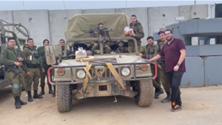


6 TORAH TIDBITS 1505 / MISHPATIM 5783
Aharon Karov delivering mishloach manot to OU Israel Youth Centers alumni
Debbie a"h םילשוריו ןויצ ילבא ראש ךותב םכתא םחני םוקמה
As we mark the first yahrzeit of Sarah Kohn a"h we reflect on her life as a cherished wife, loving mother, devoted grandmother and proud great-grandmother. She is deeply missed by her husband David Kohn and the Kohn, Kantrowitz, and Belenky families. May her memory bring comfort and peace to all who knew and loved her.
The OU Israel Family sends heartfelt condolences to Gershon Markowitz and family on the sudden passing of his wife
hours to create the packages, plan dropoff routes and organize participants. Yet every Purim, our staff and teens traverse the country to bring mishloach manot to alumni on duty who are stationed as far out as Eilat.
Beyond the tremendous kiddush HaShem this initiative brings, all those involved bring both simcha and achdut, further elevating the holiness of Purim. From the donors to the staff, to our OU Israel Youth Center’s teens and alumni, each person plays a role in enhancing the joy of Adar and Purim. For those looking to for a meaningful Purim initiative, you can transform a Chayal’s Adar with Mishloach Manot for 70 NIS / $18 via this link: www.ouisrael.org/purim
but you could possibly do them. For when it comes to communications from G-d, you are unique, irreplaceable, sui generis, one of a kind.
This exchange presents a fundamental principle of the Torah: that G-d speaks to Moshe in a way that He does not, nor will He in the future ever do again with anyone else. When Moshe says that people come to him seeking G-d, what he means is: I have access to G-d. He speaks to me. (Speaking to G-d isn’t the trick; the trick is when He answers back.) Similarly, when Moshe says that he teaches G-d’s law, what he means is that G-d communicates those laws to him and to no one else.
As we welcome in the month of Adar, I daven that it be a month of unifying simcha and safety. May the families and friends of Yaakov Yisrael Paley HY”D, Asher Menachem Paley HY”D and Alter Shlomo Lederman HY”D find comfort and strength. Please continue to daven for Moshie Paley and his father, Avraham Paley. Please also daven for Nadav Chaim ben Irit Chaya, the soldier who shot the terrorist in Ir David and is still recovering.
Keren Malki empowers families of children with special needs in Israel to choose home care. Donations are tax-approved in Israel, US and UK.

Wishing you all a truly uplifting and inspiring Shabbat,
This could very well be the prime purpose of this Yitro story. For, in the very next story, the giving of the Torah, the very same theme of Moshe’s uniqueness as the one to whom G-d speaks is central.
Rabbi Avi Berman
kerenmalki.org

02-567-0602


Honoring the memory of Malka Chana Roth ד”יה 1985-2001, killed in the Sbarro bombing.
Executive Director, OU Israel aberman@ouisrael.org

3rd aliya (18:24-27) Moshe heard. He chose judges, with only the most difficult cases brought to him. Moshe sent Yitro home.

It takes an honest leader to accept suggestions to improve. Moshe displays his honesty and humility – if the suggestion is good, embrace it. Just as Yitro accepted the news of the Exodus and affirmed One G-d,


OU ISRAEL CENTER 7
MarSea Modest Swim & Casualwear www.MarSeaModest.net (NIS) www.MarSeaModest.com ($USD) Marci Rapp 050-424-8359 THE BEST DESIGN, ENGINEERING AND INSTALLATION OF AIR davidz@AshkelonProperties.com LIVE OPPOSITE THE SEA 0544-332621 said another happy client Ashkelon for only 15% down – is actually a reality.”
your own apartment
not
but
monetary
Anglo-populated, sunny Ashkelon
answer! It’s very affordable – from $500,000 with just a 15% down payment, mortgages available as well as bank guarantees. Rental income often in excess of 3.5%. LIVE OPPOSITE THE SEA davidz@AshkelonProperties.com call David at 054-433-2621 www.ashkelonproperties.com The Time to Act is right Now! NOW is the winter market lull, when builders are flexible with pricing. Ashkelon Properties has sea view apartments, near the beach, marina, restaurants and shuls
Owning
does
just allow you freedom,
offers
savings, and an increase in your investment value.
is the
80th Birthday
(Buddy) Frankel
and Success!
Happy
Benish
Blessings
OU Executive Vice President

The Power to Serve
Powerful people exercise control over others that obscures their view of God. Good people employ kindness and respect and marshal their resources to highlight God’s power and presence.
This correlation links the Torah’s religious and social responsibilities, bein adam laMakom u’bein adam lachaveiro, symbolized by the twin luchot (tablets) given to Moshe at Sinai, and specifically informs the teachings that immediately followed the Sinai experience, the intricate interpersonal mishpatim (monetary laws) and the mishkan (Temple) building project.
Limits on interpersonal domination are the unifying theme of the laws in Parshas Mishpatim, beginning with the limitations on slavery and continuing with the responsibility to make whole anyone whom we may have economically harmed. The foundation of all these laws was established at Sinai where we were taught that we are subject solely to G-d and not to other men
(see Rashi to 21:6). Then, in next week’s parsha, we move on to the mitzvah of building G-d’s home on earth, the mishkan. This is introduced as a funding project, using our resources to construct a home for G-d (Shemos 25:1-8).

Taken together these two teachings combine to share this strong message: In a world where people can easily use personal and financial power to control or dominate others, we are to use it instead to humbly recognize the All-powerful. The most powerful members of our nation, the Jewish kings, were enjoined from amassing wealth that would serve to accentuate their personal mastery over their subjects and distract them from their submission to the King of Kings (Devarim 17:17-18). Instead, the kingdom of David was built upon his passion to build G-d a mikdash, leading the nation to join the king in positively deploying their resources for the purpose of building G-d’s presence on earth.
This message lies at the heart of the mitzvah of shekalim that is the focus of our additional reading this Shabbos. The Talmud (Megillah 13b) teaches that the annual Rosh Chodesh Adar national campaign to fund the Temple service provided the antidote to Haman’s scheme in the Purim story (see Tosafos Megillah 16a). Haman pledged 10,000 blocks of silver to buy the heads of the Jewish people. This was the
8 TORAH TIDBITS 1505 / MISHPATIM 5783 FROM THE DESK OF RABBI
HAUER
MOSHE
םילשוריו ןויצ ילבא ראש ךותב םכתא םחני םוקמה
Condolences to Bob Gold and family on the passing of his brother Kenneth z"l
ultimate power grab; one man using his money to dominate others. The antidote to that scheme was the Jewish national effort to pool their resources in a shared project, where the rich do not dominate the poor (Shemos 30:15), and where all join to build and service the home of the One who truly rules us all.
Every Purim, we deploy our resources to benefit others in fulfillment of the mandates of mishloach manos u’matanos l’evyonim. We provide each other with care and support, following the example of Esther, that powerful Jewess who used her power to help her people and risked her own life for the sake of others. That obvious dedication to others and humble use of power would seed Esther’s more hidden legacy to the Jewish people, as it was Esther’s son, King Daryavesh (Vayikra Rabba 13:5), who would use his power to build the recognition of G-d by his role in the rebuilding of G-d’s home on this earth, the Second Bais Hamikdash. Queen and king, mother and son, leveraged their unparalleled commanding positions to perform kindness and to build recognition of the Almighty.


This is a powerful lesson that can guide us forward with kindness and humility to the building of G-d’s ultimate home on earth, the third and final Bais Hamikdash, soon in our days, Amein.
SHAAREI CHESSED / RECHAVIA
1) Renovated 110 sqm 3 bdrms, 1st floor, succah.
2) Beautiful 3 bdrm apt + 50 sqm succah balcony, shabbat elevator, parking and view.
3) New 228 sqm duplex penthouse, 30 sqm succah balcony, shabbat elevator, parking and a view.
GERMAN COLONY
2 bdrms, 2 bathrooms, succah+ roof terrace.
OLD KATAMON
125 sqm, priv. entrance 3 exp. NIS 4,300,000
TALPIOT
Lovely 3 bdrms, 2 bathrooms, balcony, view, elevator, storage room, parking.
HAR NOF
* 5 rooms, renovated, large succah, view!
* Shlav B– 200 sqm garden duplex apartment.
BAKA– Spacious 2 bdrms, 2nd floor, furnished, succah balcony, private parking, immediate. NIS 6500
OU ISRAEL CENTER 9
PROJECTS, BUILDINGS AND VILLAS Presales and immediate occupancy.
Eiferman Properties www.eifermanrealty.comLtd. JERUSALEM SALES FOR SALE - NEW LISTINGS
FOR RENT
FOR MANY MORE PROPERTIES: 02-651-4030
םילשוריו ןויצ ילבא ראש ךותב םכתא םחני םוקמה
Condolences to Itzhak & Judy Kotler and family on the passing of his Father z"l
KI TEITZEII
MISHPATIM
Egypt. Time to journey to the Land.
Rabbi Reuven Tradburks Director of RCA Israel Region
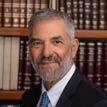
The first half of Parshat Mishpatim has 51 mitzvot in 86 verses. This is the substance of civil law. The second half of the parsha resumes the narrative, describing the impending entry into the Land of Israel. Moshe ascends the mountain to receive the tablets.
Why is the narrative broken with this presentation of civil law? The previous parsha described the drama of Mt. Sinai. The end of the parsha continues with that story. Why interrupt the story with civil law?
Because this is not a break in the story line at all. The story line is the journey to the Land of Israel. I mean, the storyline of the entire Torah from the time of Avraham. Moshe was told at the burning bush that G-d would take the people out of Egypt to bring to the Land of Israel. We are out of
But it is not just a journey to a Land. It is a journey to a new life; a Jewish society in the Land of Israel. We aren’t just leaving Egypt; we are journeying to our Land and our own society. But that society we are going to build – don’t make it like the one in Egypt. Leave Egyptian society behind. Our Jewish society is to be nothing like that: we are building an anti Egypt society. Leave behind its abuse of slaves, its flippant disregard for human life (babies in the river), its excessive use of physical force (the slave master).
Our Jewish society will respect life, respect others, delineate regard for the property of others and build a society of goodness and justice. So in that regard, it makes perfect sense to begin the description of the march to the Land with what our Jewish society will look like when we get there. And we will see that it is built on the very things that Egyptian society failed at: slavery, physical assault, property infringement.
To give some structure to these 51 mitzvot, I have introduced each section with a heading in bold, indicating the topic of the laws that follow.
Passed away 26 Tevet 5783
Hakamat Matseva
on Sunday, 19 February
For info: david.raab@gmail.com
1st aliya (21:1-19) And these are the laws you are to instruct them in. The laws of slaves: a Jewish slave goes free after working 6 years. If he chooses, he may extend his slavery permanently. The owner or his son may marry a female slave. If they choose not to, she goes free upon puberty. Physical assault resulting in death is punishable by death; as is assaulting a parent, kidnapping, cursing a parent. For bodily assault
10 TORAH TIDBITS 1505 / MISHPATIM 5783
ALIYA-BY-ALIYA SEDRA SUMMARY
ל"ז
The family mourns the loss of Rabbi Dr. Menachem Raab
not resulting in death, payment is made for damage, unemployment and medical costs.


Though odd to begin civil law with laws of slaves, if our civil law is to be built on foundations that Egypt failed at, then proper treatment of slaves would be the first thing for the recently released slaves to appreciate. And respect for human life.
and our next step will be to plant a fruit tree. I never thought of myself as being the agricultural type, but the feeling of settling and planting a portion of Eretz Yisrael, has been truly euphoric. Iy”H, when we plant our tree, and eat the fruits that will grow one day, I think we will be able to truly appreciate that unique Kedusha found in the fruit of Eretz Yisrael!

To conclude, when you buy your Tu B'shvat fruit this year, don’t search for those dried apricots and banana chips imported from Turkey. Rather, head over to the fresh produce and buy yourself some nice juicy Kedusha-filled Jaffa oranges and thank Hashem for bringing you to this land in order to be able to הבוטמ עבשלו הירפמ לוכאל, imbibing that Kedusha in every bite that you take!!
2nd aliya (21:20-22:3) Physical assault resulting in financial payment: assault of slaves, of a pregnant woman resulting in a lost pregnancy. Assault of a slave resulting in loss of an eye or tooth grants the slave his freedom. Death caused by my property or actions: a goring ox resulting in death of a person, death of an animal as a result of a pit dug by me, or as a result of my ox goring another. Theft and sale or slaughter of animals requires restitution of 4 or 5 times the value of the loss. In clandestine theft, if the thief is killed, the perpetrator is deemed to have acted in self-defense. The punishment for theft is double the stolen object. Jewish society, unlike what we saw in the Egyptian treatment of us, will be built on respect of people. Respect for their life itself. Respect for their dignity. And respect for their property. The topic of this aliya is not oxen goring oxen; it is people taking responsibility for their property. If my property damages yours, I take full responsibility. People respecting the property of others.
3rd aliya (22:4-25) Property damage caused by my property: damage to your property must be compensated if done by either my grazing animals, or by a fire lit by me in my property; laws of compensation for loss of
In the heart of calm and pastoral BAKAArab house 6 rooms, 500m + possibility of building 250m, huge garden, approx. 700m, completely renovated, underfloor heating + air conditioning, large parking, 5 bathrooms, 5 toilets, green
MENDEL 052-8980111
VERY GOOD INVEST! In Bustan BakaIn a beautiful boutique building – Large 2 room apartment, ground floor (0 steps), elevator, balcony, parking
2450000NIS MENDEL 052-8980111
BAKA - quiet and pleasant little street5 rooms, 175m, on one level, alone upstairs, private entrance, elevator in the apartment, high ceilings
MIKAEL 052-3202488
In the heart of BAKA - on a calm and pastoral street - Spacious 5 rooms, elevator, terrace, store-room, parking, near all amenities, 5300000NIS MICHAEL 052-3202488
OU ISRAEL CENTER 11 OU ISRAEL CENTER 75
your property while being guarded or borrowed by me. Abuse of power: seducing an unwed woman, sorcerers put to death. If one oppresses the stranger, widow or orphan and they call to Me, your wives will be widows, children orphans.
Returning to the theme of rejecting the norms of Egypt the superpower; power does not grant privilege. There are people with power. And people without. The foreigner, the widow and the orphan have no power – they are alone, with no one to champion their cause. Do not prey on their lack of power. I, says G-d, am the Champion of those who have no power. They may have no person to turn to. But they always have Me. You, with power, who take advantage of those without; you will have Me to reckon with.
4th aliya (22:26–23:5) Good citizens: do not curse judges or rulers, do not delay obligations, nor ally with tricksters to pervert justice, nor follow a bad crowd in disputes. Helpful neighbors: return a stray animal, help unburden a buckled animal even of your enemy.
The power imbalance of Egypt that bred resentment of those in power is not for us. It is not us versus the leaders. We are them: respect those in power, for they serve us. Our society is to be cooperative for the
good of us all. And bettering the lives of others is not the sole responsibility of the government. We all need to make the lives of others better. Initiate the return of lost items, unburdening the burdens of others.
5th aliya (23:6-19) Justice: do not pervert justice – of the poor and weak, through lies, through bribes and of the foreigner, for you were foreigners in Egypt. Man’s limits in G-d’s world: work the land 6 years, leave it for the poor in the 7th. Work 6 days, allow rest to your workers on the 7th. Observe the 3 pilgrimage festivals: Pesach, Shavuot, Sukkot. Do not appear empty handed.
This detailed listing of what we would call civil law concludes with Shmita, Shabbat and the holidays. The root of a Jewish society is the healthy realization of the limits of man and our partnership with G-d. We work; but the Land is His. We employ workers; but we are all servants to Him. Our agriculture is punctuated by holidays; so as to temper our pursuit of wealth for wealth’s sake with an infusion of standing before Him.
6th aliya (23:20-25) Journey to the Land: I am sending My angel to guide you to the Land of Israel. Loyalty to what I say will ensure your successful settling of the Land. Don’t worship idols there; rather serve G-d and you will enjoy blessing and health in the Land.
on his 8th Yahrzeit - רדא 'ד
The listing of the mitzvot concludes and the narrative picks back up. We are on our way to the Land of Israel, armed now with a vision of what that society will look like. In just a few months we’ll be setting up a new Jewish society in the Land of Israel.
12 TORAH TIDBITS 1505 / MISHPATIM 5783
ל"ז הגייפו בקעי ןב ןימינב
In memory of our beloved Husband, Father, Grandfather and Great-Grandfather
Hazzan
Benjamin Stein z"l
been memorialized in a popular song, "An eternal people does not fear the long and arduous path."
be in loving memory and נ"על our dear parents whose yahrtzeits are in Kislev
Doris Weinberger a"h
ולסכ 'ד -ה"ע המלש לאקזחי תב האל הרובד
After hearing those mitzvot, we now know in what way it will be a Jewish society – one rooted in justice, respect, responsibility and kindness.
Max Weinberger z”l
ולסכ ז"כ -ל"ז בד ןב ךלמילא
Greatly missed by their children, grandchildren and great grandchildren
Rav Aryeh and Dvora Weinberger
Bernie and Leah Weinberger
Patience is necessary for those who follow Isaac's way. But a wise woman taught us that patience is but another name for hope. That woman was Jane Austen, who put these words into the mouth of one of the characters in her great novel, Sense and Sensibility: "Know your own happiness. You want nothing but patience—or give it a more fascinating name: call it hope."
SEALING SERVICES AND ROOFING


Menachem and Hannah Katten
In observance of the Shloshim of our friend
Yehuda Leib Berren z"l
Rav Menachem Weinberg will give a shiur in his memory "Heroic Joy"
Monday evening, 23 November/ 8 Kislev

7:30pm
Zoom Meeting: 853 8980 1519

Password: Yehuda
7th aliya (23:26-24:18) Your opponents in the Land will cower. I will cause them to leave slowly over time so the Land will not be desolate when you arrive. Do not make a pact with the people in the Land; they may not dwell with you lest you end up serving their gods. Moshe ascended the mountain, wrote the words of G-d. He built an altar at the foot of the mountain; offerings were brought. He read the words of the covenant; the people responded that they will fulfill it all. Blood was sprinkled as a covenant. Moshe ascended with Aharon, Nadav and Avihu and the 70 elders; they perceived sapphire, the purity of the heavens. G-d called Moshe up the mountain to give him the luchot, the Torah and the Mitzvot. The cloud of G-d was on the mountain, the vision of G-d like a consuming fire. Moshe was there for 40 days and 40 nights.
The last aliya of a parsha gets scant attention. But this last paragraph? Sapphire, vision of purity of the heaven, a cloud and fire on the mountain. While we often focus on the con tent of the 10 commandments at Sinai, much more attention is given in the Torah to the drama of the experience; both in Yitro last week and in this descrip tion. The experience of Sinai is frightening. The people felt unsure, frightened, unworthy, overwhelmed, confused. They
When
02-674-3888
OU ISRAEL CENTER 13
GET A PROFESSIONAL VISION EXAM
FREE exam with purchase USING THE MOST ADVANCED DIAGNOSTIC EQUIPMENT Multifocal Experts Contact lens fittings Satisfaction guaranteed! • Wide selection of beautiful frames You Deserve a Professional Vision Exam
call for an appointment Macabi and Meuchedet benefits
Please
12 TORAH TIDBITS 1440 / CHAYEI SARA 5782
Avraham addresses the people of Cheit, trying to This seems to be a contradiction. If one is a stranger than The Magid of Dubno (Jacob ben Wolf
this tense situation in order to, both, state his truth and be said, on the one hand, “I am a Resident’ due to G-d’s promise need your agreement to purchase a plot. In other words, Avraham “strangers”, while they understood him as saying that “they” completes the generational transfer – He blesses Yitzchak. The Jewish people will be Yitzchak and not Yishmael. and began father’s that icant the OU ISRAEL CENTER 15
Kranz 1741-1804)
SEALING SERVICES 052-385-9944 • 054-499-9043
shmuelnathan4@gmail.com
want a close and benevolent G-d, but they may very well be having second thoughts on seeing the power and implications of what a close G-d means.
This heavenly vision, following the civil law, creates the dual nature of the Jew: peering into the unknown, lofty, ephemeral world of the heavens. While living in this earthly world where my animals break your property. Reaching for heaven. Walking on earth.
HAFTORAH II MELACHIM 11:17-12:17
The Parshat Shekalim Torah reading discusses the annual obligation for every Jew to give half a shekel to the Beit Hamikdash. The haftorah discusses the efforts of King Yehoash to mark these communal funds for the upkeep of the first Beit Hamikdash.
Idol worship had become rampant in Malchut Yehuda. When the king of Malchut Yehuda, Achaziah, was killed, his mother Athaliah murdered the remainder of the royal family and seized the throne. During
A SHORT VORT
her brief reign, she actively promoted idolatry. Unbeknownst to her, one of Achaziah’s sons, a small baby, was hidden and survived. When he became seven years of age, Yehoiada the High Priest led a successful revolt against Athaliah, and installed the child king, Yehoash, as the new King.
The haftorah begins with the new king renewing the people’s covenant with G - d. They destroyed all the pagan altars and statues and appointed officers to oversee the Beit Hamikdash. Yehoash then instructed the kohanim regarding all the funds that were donated. According to his plan, all the funds would be appropriated by the kohanim. In return, the kohanim would pay for the regular maintenance of the Beit Hamikdash. In the 23rd year of Yehoash’s reign, the kohanim neglected to properly maintain the Beit Hamikdash. Yehoash then ordered that all monies should be placed in a special box that was placed near the mizbeach and these funds were given directly to the workers and craftsmen who maintained the Beit Hamikdash.
BY RABBI CHANOCH YERES
R av, Beit Knesset Beit Yisrael, Yemin Moshe
In Memory of my father’s tenth Yarzheit 28th Shevat, Rabbi Yitzchak Chaim ben Moshe Yosef Halevi
“ו:אכ) ”עצרמב ונזא תא וינדא עצרו הזוזמה לא וא תלדה לא ושיגהו)
“And he shall bring him to the door or the doorpost and his master shall pierce his ear with an awl.” (21:6) Out of all places to pierce the Jewish servant’s ear, why specifically by the doorpost?
Rashi answers that the doorposts were witness to the Exodus from Egypt where G-d told us “For unto Me are the children of Israel servants” and ‘not servants to servants.’
The Kli Yakar (Rabbi Shlomo of Luntshitz 1550-1619) gives additional reasons.
With this chance to become finally free, the man may be too lazy to enter a world that he needs to support himself. He may have hesitation to take the opportunity to become free, therefore, his ear is bored at this very door, he holds back, refusing to exit.
Additionally, the doorpost contains the mezuzah which is written to love G-d. This person is declaring with his decision, that he loves his wife and children and will continue to serve his master instead of establishing his own home in Israel. In essence, he is exchanging the love of G-d for his love of his wife. The place of the mezuzah is very appropriate for this moment. Shabbat Shalom
14 TORAH TIDBITS 1505 / MISHPATIM 5783
STATS
18th of 54 sedras; 6th of 11 in Sh’mot
Written on 185 lines in a Torah (31st)
33 parshiyot; 6 open and 27 closed
118 p’sukim - ranks 22 (5th in Sh’mot) 1462 words - ranks 31 (7th in Sh’mot)
5313 letters - ranks 37 (8th in Sh’mot)
Mishpatim’s p’sukim are among the shortest in the Torah.
MITZVOT
MISHPATIM has 53 mitzvot; 23 positive and 30 prohibitions.
Only 3 sedras have more mitzvot - Ki Teitzei (74), Emor (63), and R’ei (55).

Most exquisite properties in Jerusalem!!


New Listing! On the exquisite Dubnov St. in Talbieh, private 135m cottage, totally renovated with 65m private landscaped garden, view from balconies, a real gem! MAYA - 054-6650184
Magnificent Authentic private house on a small dead end of Baka - 650m built on 3 levels with huge basement, 750m plot with wonderful landscaped garden, thoughtful layout, an abundance of light,a unique property!
DEBORAH - 054-4804767
Luxurious garden apartment on a small lane of Old Katamon, 340m built on 2 levels, 8 rooms, separate unit with separate entrance, high ceilings, full of charm, very quiet & bright, 130m private garden, top of the line finishes, close to the park
DEBORAH- 054-4804767
In a small lane of the German Colony, Garden apartment with private entrance, 250m with private garden, parking, high ceilings, in an Authentic beautiful 3 apartment building
MAYA – 054-6650184
Beautiful new penthouse in Greek Colony- 190m with 80m terraces, succah, beautiful views, 5 rooms, elevator, parking, renovated at very high standard, spacious living areas and huge kosher kitchen
MAYA – 054-6650184
On the edge of The German Colony - Unique Authentic building of 700m built on a huge plot of 1,200m - perfect for an apartment building or a tremendous private house.
DEBORAH - 054-4804767
Private small building in Baka, Shimshon St. 300m with additional building rights, huge private garden, divided into 3 units so can be private house of 3 separate apartments, very attractive price
DEBORAH - 054-4804767
On the exquisite Elcharizi St., Rechavia, new project, new 280m penthouse, 100m terraces, finishes and layout according to buyer requests!
DEBORAH - 054-4804767
Ben Maimon St. Duplex new apartment, 5 bedrooms, 4 ensuite, 4 terraces, private parking, Shabbat elevator, all renovated, 3 exposures, very sunny!!
DEBORAH-054-4804767
02-6744000
0544-804767

OU ISRAEL CENTER 15
T&T INVESTMENTS
King David St. 26 www.real-estate-jerusalem.co.il LEADING BOUTIQUE REAL ESTATE FIRM, O n M e n d e l e S t . T a l b i completely renovated, •
Mazal Tov to Elisheva & Ari Weingarten and family on the Bar Mitzvah of their son, Yitzchak Tzvi
B'CHODSHO
Ad D’lo Yada… Madua?
Of all the guidelines connected to the festival of Purim, none is stranger than the Talmudic mandate issued by Rava:
M’chayeiv inish li’visumei b’Purya ad d’lo yada bein arur Haman l’varuch Mordechai.
An individual is required to become intoxicated on Purim to the point where he can not distinguish between ‘cursed be Haman’ and ‘blessed be Mordechai.’1
Before striking to the philosophical core of this mandate, allow me to clarify my position concerning its practical observance.
I find myself squarely in the camp that decries the excesses often committed in its pursuit. Unbounded drinking is frequently demeaning and can become downright dangerous. At a time when alcoholism is a growing problem in the Jewish community at large, Purim should not provide a portal through which many young people might first enter that world.
The halachic alternative quoted by Rav
1
Talmud Bavli Megilla 7b
Mazal Tov to our dear friends
 BY RABBI SHMUEL GOLDIN Faculty, OU Israel Rabbi Emeritus, Congregation Ahavath Torah, Englewood NJ
BY RABBI SHMUEL GOLDIN Faculty, OU Israel Rabbi Emeritus, Congregation Ahavath Torah, Englewood NJ
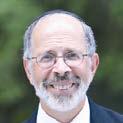
Moshe Isserles in his gloss on the Shulchan Aruch is worthy of note:
“
REBBETZIN SHIRA SMILES Tribute to the Trio
Some say it is not necessary to become so drunk, but to drink more than one is accustomed to and to fall asleep. While asleep, an individual will not know [the difference] between “cursed be Haman” and “blessed be Mordechai.” 2
Commenting on this approach in the Mishna Berura, the Chofetz Chaim states:
“And such is fitting to do.” 3
Regardless of our practical position on Ad d’lo yada, however, a deeper question confronts us:
What is Rava’s motivation?
In a deeply powerful scene, Moshe Rabbeinu is found with his hands held high on top of the mountain praying for the people gripped in a raging battle with Amalek below. Ahron and Chur stood on either side of Moshe Rabbeinu holding his hands aloft (Shemot 17;10). Rashi teaches that Chur was the son of Moshe’s sister, Miriam. What more do we know about Chur?
What is the symbolism of his joining with Ahron to support the hands of Moshe Rabbeinu?
Why does this towering Talmudic sage demand that we enter a state where the difference between “cursed be Haman” and “blessed be Mordechai” becomes indistinguishable?
The very idea seems to fly in the face of all that Jewish thought holds dear…
From the moment when HaShem “separated between the light and the darkness” during the process of creation; our mandate has been to separate and distinguish: between the sacred and the secular, between good and
2 Orach Chaim 695:2
3 Ibid 695:2
on stood and teach people calf Chur, person like qualities relationships path, whenever service shamayim example These Rabbeinu approaches have Amalek,
16 TORAH TIDBITS 1505 / MISHPATIM 5783
MIDEI CHODESH 26 TORAH TIDBITS / BESHALACH 5781
Rabbi Roberts in Through the Prism of Torah explains that Ahron and Chur personified contrasting character traits. Ahron was a peacemaker, he constantly looked for ways to create harmony among his people. Indeed, he was ready to compromise his own values to achieve this goal, as we see in the story of the sin of the golden calf. Chur, For In 4 elevator, character, of For house, renovation, bathroom, asking
Ariella and Rafi Jacobson on the birth of their beautiful baby girl!!
evil, between the likes of Haman and the likes of Mordechai.

Why would Rava demand the opposite on Purim?
The answer to this question, I believe, rises out of a larger phenomenon surrounding the Purim festival. While a full discussion of this phenomenon remains beyond the scope of this article, I will share the fundamental idea in brief.
The festival of Purim specifically emerges at the point of history when the Babylonian exile changes from an “exile of force” to an “exile of choice.” Given the opportunity to return to the Land of Israel, the vast majority of Babylonian Jews choose to remain in Babylon. In response to this reality, HaShem forces his people to experience the true consequences of their decision.
If this is the world in which you choose to live, I will show you its true colors…
And the Purim story unfolds, suddenly threatening the comfortable Jewish community with extinction.
Properly understood, every aspect of the Purim story highlights the Jewish nation’s relationship with an outside world and underscores the challenges that such a relationship entails. The lessons taught by Purim have spoken to diaspora communities across time. In our day, they speak to a Jewish State dealing with the “community of nations,” as well.
This, I would suggest, is where Rava’s
Mazal Tov to Esther & Moshe Davis and family on the Bar Mitzvah of their grandsons
mandate comes in…
The world has changed little since the unfolding of the Purim story. We continue to live in a world that makes little sense. A world where the lines separating good and evil, right and wrong, truth and falsehood, and so much more, are far from distinct.
In this world, nations guilty of the most egregious human rights violations imaginable can sit at the heads of UN commissions on human rights, chastising the State of Israel on a continual basis.
In this world, antisemitism can re-emerge across the globe; uniting the far-right and the far-left behind the one principle they agree upon: “the Jews are at fault.”
In this world, terrorists targeting civilians are equated with soldiers targeting terrorists.
In this world, when you say it loudly and often enough, right becomes wrong and wrong becomes right… the distinction between ‘cursed be Haman’ and ‘blessed be Mordechai’ truly disappears.
Ad d’lo yada…
One day a year, Rava maintains, we are meant to experience the topsy-turvy world around us in its purity; to face the absurdity of a surrounding realm that does not distinguish between ‘cursed be Haman’ and ‘blessed be Mordechai.’
And then, having confronted the malevolence of that world, we are to return to our own: better equipped to fight the evil around us and to prevent that evil from changing us.
Rabbi Goldin is the author of the OU Press volumes “Unlocking the Torah Text,” and “Unlocking the Haggada."
OU ISRAEL CENTER 17
The Many Lessons of ‘Half’
I was never very good at math. It all goes back to the fourth grade. I came down with a case of some ordinary childhood disease, probably chicken pox, at just the time that Mrs. Levine was teaching the class about the concept of percentages. I must’ve missed about a week of school, and when I returned to class, it seemed as if everyone was speaking Greek. Phrases like “50%” and “75%” and “a half” and “three-quarters” cut the air, and I simply did not know what these strange words meant. Mrs. Levine probably tried to catch me up with the rest of the class, but all I remember are feelings of frustration.
It was my rebbe, the man who taught us religious studies in the mornings, who came to the rescue. He realized that I was beginning to think of myself as dumb, and
BY RABBI DR. TZVI HERSH WEINREB OU Executive Vice President, Emeritus



he was concerned about my damaged self-esteem.
“You are far from the first person to be puzzled by percentages,” he said comfortingly. “Moshe Rabbenu, Moses our teacher, also had his difficulties with math, and it was the Master of the Universe Himself, the Ribbono shel Olam, who helped him out.”
As a mere fourth-grader, I was in no position to question the good Rabbi, and I was ashamed to ask him where he found a biblical allusion to Moses’ incompetency in mathematics. But he soon filled in the gap.
“This week,” he told me, “we do not only read the Torah portion of Mishpatim (Exodus 21:1-24:18). This Sabbath is special because it is the last one before the month of Adar. It is Shabbat Shekalim.
We will read a short additional paragraph, Exodus 13:11-16, in which we will learn how Moses was instructed to ask each Jew to donate a half-shekel toward the

18 TORAH TIDBITS 1505 / MISHPATIM 5783 THE PERSON IN THE PARSHA
TRANSFER YOUR OLD FILM/VIDEO's (All formats) In Quality to Digital Preserve Family History from Fading Michael 052.286.8626 Photography with feeling Facebook.com/L'Dorot Photography Please note the updated mailing address for the OU Israel Center: OU Israel 22 Keren Hayesod POBox 1441 Jerusalem 9101302
maintenance of the tabernacle. This donation was required throughout the history of the Holy Temple in Jerusalem. The funds were collected during the month of Adar. Now that the Temple has been destroyed, we commemorate the collection of the halfshekel by reading about it in the synagogue on the last Sabbath before Adar.”
I told him that I remembered learning all about this mitzvah last year but failed to see any evidence of Moses’ mathematical handicap in that passage.
It was then that he shared with me the fascinating anecdote originating in the Midrash Tanchuma, and quoted in abbreviated form by Rashi in his remarks on verse 13. As an outstanding pedagogue, my Rebbe did not read the quotation to me verbatim, but elaborated upon it in a way he knew I would find interesting and relevant to my personal quandary.

“Moses had great difficulty with this commandment. There was something about the half-shekel that he simply couldn’t understand. We do not know precisely what he found so puzzling. But we are told that the Almighty sympathized with Moses and vividly demonstrated what the half-shekel was to look like by miraculously making a coin of fire appear in the heavens. So, you are

Please send me a picture to Whatsapp for free appraisals



OU ISRAEL CENTER 19
Dr. Harry Weisman Former Assist. Clinical Professor of Medicine, UCLA School of Medicine; Div. of Endocrinology & Metabolism Weight loss Consultation +972 53 472 2159 Author of The 18% Solution –Lose 18% of Your weight in 18 Weeks We buy your Gold & Silver Personal home service - 30 years experience
& silver
We also buy silverware, gold
coins!
absaffran@gmail.com Follow Us On Facebook
I pay cash! I will meet you where you want! Customer service! 972-54-219-2428 mail:
not the only one who finds the concept of ‘half’ challenging. Moses too needed a little help with it.”
The rebbe’s attempt at restoring my self-esteem was quite helpful. I did not get a visual demonstration from the Almighty, but I did get the courage to approach Mrs. Levine and asked her for an afterschool tutorial.
Ever since this little episode, which happened more years ago than I care to mention, I have sought out explanations of the significance of the half. Why were we not required to give a whole shekel, a complete coin, as our contribution? Was it simply because that would have been too great of an expense to require of each individual? I somehow don’t think so.
And so, over the years, I have amassed a collection of dozens of explanations on the symbolic meaning of half a coin. I can’t possibly share them all with you, dear reader, in this brief column. I’ll give you some samples instead.

One explanation, which makes for excellent sermonic material, is that none of us is a complete entity. No one is spiritually self-sufficient. We are all only half of the picture, and we all need each other. Hence, we contribute only half a shekel, to impress upon
ourselves that we can’t go it alone but need another person in order to be complete.
Another approach is based upon that famous saying of Rabbi Tarfon, in Ethics of the Fathers, Pirkei Avot. “It is not incumbent upon you to complete the task, but nevertheless you are not permitted to exempt yourself from it entirely.” Being required to only give half a shekel drives home the point that total completion of the task is not expected of us. All we can each do is try our best and do our share.
Yet another approach is advanced by one of the classics of Jewish mysticism. The Zohar emphasizes that this world is a diminished one, in which there are broken vessels which need to be restored. We live in an imperfect world, and its imperfection is symbolized by being a broken shekel.
I encourage each of you to use the opportunity of this week’s supplemental Torah reading to meditate upon either the mundane half-shekel or the celestial fiery coin. I am quite certain that you will creatively find symbolic meanings of your own. And, if you wish, feel free to send them to me at execthw@ou.org. If any of your suggestions are really on the mark, I will share them with the rest of my readership in a future Person in the Parsha.
20 TORAH TIDBITS 1505 / MISHPATIM 5783
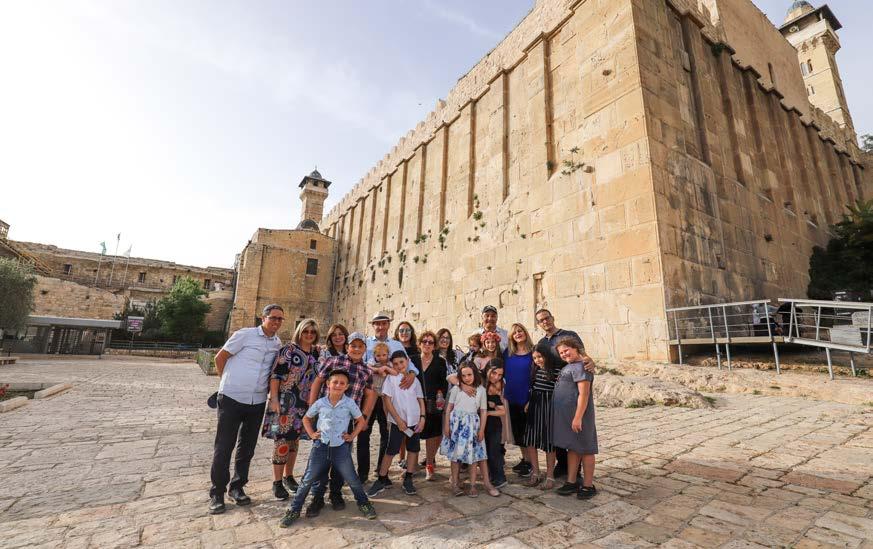




















החמשב ןיברמ רדא Rosh Chodesh Hevron Tour 22 February 2023 PROGRAM • A Musical Rosh Chodesh Shacharit A scrumptious breakfast • Tour of Maarat HaMachpela Avraham Avinu Synagogue • Local Guest Speaker • Beit Hadassah www.lovingtheholyland.com Including transport & Breakfast ררחלא והילא ברה וירדהמל רשכ OUR GUIDE RABBI ALON ROGOFF Will share his passion & love for the land of Israel and our people. He frequently guides in Hevron & is excited to share his unique perspective of Hevron, City of Lovers. Rabbi Rogoff is a registered Israeli tour guide LIMITED PLACES FIRST TEN TO SIGN UP GET ₪100 DISCOUNT 058-693-1844 OU ISRAEL CENTER 55 “TzviAir is a pleasure to work with and did an amazing job!” – Jamie Geller, Celebrity Chef AIR CONDITIONING SALES & SERVICE 02-628-8282 | tzviair.com
COVENANT & CONVERSATION
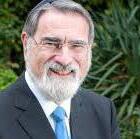
the learning of these Divrei
Doing and Hearing
One of the most famous phrases in the Torah makes its appearance in this week’s parsha. It has often been used to characterise Jewish faith as a whole. It consists of just two words: na’aseh venishma, literally, “we will do and we will hear” (Ex. 24:7). What does this mean and why does it matter?
There are two famous interpretations, one ancient, the other modern. The first appears in the Babylonian Talmud,1 where it is taken to describe the enthusiasm and whole-heartedness with which the Israelites accepted the covenant with God at Mount Sinai. When they said to Moses, “All that the Lord has spoken we will do and we will hear,” they were saying, in effect: Whatever God asks of us, we will do – and they said this before they had heard any of the commandments. The words, “We will
1 Shabbat 88a–b.
hear,” imply that they had not yet heard – neither the Ten Commandments, nor the detailed laws that followed as set out in our parsha. So keen were they to signal their assent to God that they agreed to His demands before knowing what they were.2
This reading, adopted also by Rashi in his commentary to the Torah, is difficult because it depends on reading the narrative out of chronological sequence (using the principle that “there is no before and after in the Torah”). The events of chapter 24, according to this interpretation, happened before chapter 20, the account of the revelation at Mount Sinai and the Ten Commandments. Ibn Ezra, Rashbam, and Nachmanides all disagree and read the chapters in chronological sequence. For them, the words na’aseh venishma mean not, “we will do and we will hear,” but simply, “we will do and we will obey.”
The second interpretation – not the plain sense of the text but important nonetheless – has been given often in modern
2 There are, of course, quite different interpretations of the Israelites’ assent. According to one, God “suspended the mountain over them,” giving them no choice but to agree or die (Shabbat 88a).
22 TORAH TIDBITS 1505 / MISHPATIM 5783
ה״ע
תומשנ יוליעל
זייא דוד לארשי תב הדלוגו רשא
בקעי
ןב סחנפ ה״ע רטרש קחצי תב הינעמו בייל הירא ןב לאירזע
Thoughts on the Weekly Parsha from RABBI LORD JONATHAN SACKS ZT"L
Former Chief Rabbi of the United Hebrew Congregations of the Commonwealth
May
Torah be תמשנ יוליעל HaRav Ya'akov Zvi ben David Arieh zt"l
Jewish thought. On this view na’aseh venishma means, “We will do and we will understand.”3 From this they derive the conclusion that we can only understand Judaism by doing it, by performing the commands and living a Jewish life. In the beginning is the deed.4 Only then comes the grasp, the insight, the comprehension. This is a signal and substantive point. The modern Western mind tends to put things in the opposite order. We seek to understand what we are committing ourselves to before making the commitment. That is fine when what is at stake is signing a contract, buying a new mobile phone, or purchasing a subscription, but not when making a deep existential commitment. The only way to understand leadership is to lead. The only way to understand marriage is to get married. The only way to understand whether a certain career path is right for you is to actually try it for an extended period. Those who hover on the edge of a commitment, reluctant to make a decision until all the facts are in, will eventually find that life has passed them by.5
3 The word already carries this meaning in biblical Hebrew as in the story of the Tower of Babel, where God says, “Come let us confuse their language so that people will not be able to understand their neighbour.”
4 This is the famous phrase from Goethe’s Faust.
5 This is similar to the point made by Bernard Williams in his famous essay, “Moral Luck,” that there are certain decisions – his example is Gauguin’s decision to leave his career and family and go to Tahiti to paint –about which we cannot know whether they
Jerusalem Real Estate is My Business

Eta: 054-723-3863 Rachel: 052-546-6425
Amazing stand alone homes in OLD KATAMON, TALBIYA, BAKA, GERMAN COLONY
Allenby Complex. Across from BAKA. 160 sqm penthouse quiet with views. 4 bedrooms & 2.5 bathrooms. Shabbat elevator, sukka terrace from living room plus roof top terrace 2 parking & storage. 6,400,000 NIS
Yemin Moshe beautiful property over 300 sqm. 2 private entrances (complete separate unit over 90 sqm). large garden. Close to parking & gorgeous architectural design newly renovated. Call for more info

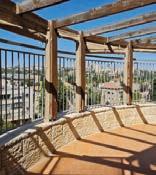

In the heart of BAKA enclosed in a magical courtyard: 3 bedrooms 2 full bathrooms one flight up. Beautiful spacious sukka terrace facing open gardens Completely renovated with architectual design & high level finishes. 6,250,000 NIS
Penthouse near BAKA. 154 sqm on one floor with 4 bedrooms and 2 full bathrooms. Shabbat elevator, 2 underground parking and 3 storage units!!! 25 sqm Sukka terrace off living room plus large roof top terrace. 6,250,000 NIS
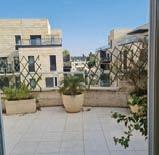
Eta Morris Realty, Ltd.

etamorrisrealestate@gmail.com
Eta: 054-723-3863 · Rachel: 052-546-6425
etamorrisrealty.co.il
OU ISRAEL CENTER 23
The only way to understand a way of life is to take the risk of living it.6 So: Na’aseh venishma, “We will do and eventually, through extended practice and long exposure, we will understand.”
In my Introduction to this year’s Covenant and Conversation series, I suggested a quite different, third interpretation, based on the fact that the Israelites are described by the Torah as ratifying the covenant three times: once before they heard the commandments and twice afterward. There is a fascinating difference between the way the Torah describes the first two of these responses and the third:
The people all responded together, “We will do [na’aseh] everything the Lord has said.” (Ex. 19:8)
When Moses went and told the people all the Lord’s words and laws, they responded with one voice, “Everything the Lord has said we will do [na’aseh].” (Ex. 24:3)
Then he took the Book of the Covenant and read it to the people. They responded, “We will do and hear [na’aseh venishma] everything the Lord has said.” (Ex. 24:7)
The first two responses, which refer only to action (na’aseh), are given unanimously. The people respond “together.” They do
are the right decision until after we have taken them and seen how they work out. All such existential decisions involve risk.
6 This, incidentally, is the Verstehen approach to sociology and anthropology; namely that cultures cannot be fully understood from the outside. They need to be experienced from within. That is one of the key differences between the social sciences and the natural sciences.
so “with one voice.” The third, which refers not only to doing but also to hearing (nishma), involves no unanimity. “Hearing” here means many things: listening, paying attention, understanding, absorbing, internalising, responding, and obeying. It refers, in other words, to the spiritual, inward dimension of Judaism.
From this, an important consequence follows. Judaism is a community of doing rather than of “hearing.” There is an authoritative code of Jewish law. When it comes to halachah, the way of Jewish doing, we seek consensus.
By contrast, though there are undoubtedly principles of Jewish faith, when it comes to spirituality there is no single normative Jewish approach. Judaism has had its priests and prophets, its rationalists and mystics, its philosophers and poets. Tanach, the Hebrew Bible, speaks in a multiplicity of voices. Isaiah was not Ezekiel. The book of Proverbs comes from a different mindset than the books of Amos and Hosea. The Torah contains law and narrative, history and mystic vision, ritual and prayer. There are norms about how to act as Jews. But there are few about how to think and feel as Jews.
We experience God in different ways. Some find Him in nature, in what Wordsworth called “a sense sublime / Of something far more deeply interfused, / Whose dwelling is the light of setting suns, / And the round ocean and the living air.”7
7 William Wordsworth, “Lines Composed a Few Miles Above Tintern Abbey, on Revisiting the Banks of the Wye during a Tour, July 13, 1798.”
24 TORAH TIDBITS 1505 / MISHPATIM 5783
Others find Him in interpersonal emotion, in the experience of loving and being loved – what Rabbi Akiva meant when he said that in a true marriage, “the Divine Presence is between” husband and wife.
Some find God in the prophetic call: “Let justice roll down like a river, and righteousness like a never-failing stream” (Amos 5:24). Others find Him in study, “rejoicing in the words of Your Torah…for they are our life and the length of our days; on them we will meditate day and night.”8 Yet others find Him in prayer, discovering that God is close to all who call on Him in truth.
There are those who find God in joy, dancing and singing as did King David when he brought the Holy Ark into Jerusalem. Others – or the same people at different points in their life – find Him in the depths, in tears and remorse, and a broken heart. Einstein found God in the “fearful symmetry” and ordered complexity of the universe. Rav Kook found Him in the harmony of diversity. Rav Soloveitchik found Him in the loneliness of being as it reaches out to the soul of Being itself.
There is a normative way of performing the holy deed, but there are many ways of hearing the holy voice, encountering the sacred presence, feeling at one and the same time how small we are yet how great the universe we inhabit, how insignificant we must seem when set against the vastness of space and the myriads of stars, yet how momentously significant we are, knowing that God has set His image and
likeness upon us and placed us here, in this place, at this time, with these gifts, in these circumstances, with a task to perform if we are able to discern it. We can find God on the heights and in the depths, in loneliness and togetherness, in love and fear, in gratitude and need, in dazzling light and in the midst of deep darkness. We can find God by seeking Him, but sometimes He finds us when we least expect it.
That is the difference between na’aseh and nishma. We do the Godly deed “together.” We respond to His commands “with one voice.” But we hear God’s presence in many ways, for though God is one, we are all different, and we encounter Him each in our own way.
Around the Shabbat Table:

Why is it important that, as a community we all follow the same behaviours and actions, for instance, by following halachah,?
Why can’t there be one sure way to connecting God and to spirituality?
Rabbi Sacks mentions several paths to God in this essay. Which of these speak to you? Are there any other routes you have found to God?
These weekly teachings from Rabbi Sacks zt”l are part of his ‘Covenant & Conversation’ series on the weekly Torah teaching. With thanks to the Schimmel Family for their generous sponsorship, dedicated in loving memory of Harry (Chaim) Schimmel. Visit www.RabbiSacks.org for more.
8 From the blessing before Shema said in the evening prayer.
OU ISRAEL CENTER 25
PROBING THE PROPHETS
BY RABBI NACHMAN (NEIL) WINKLER Faculty, OU Israel Center

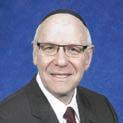
The special haftarah ordained by Chazal to be read on Shabbat Shekalim, the Shabbat of, or before, Rosh Chodesh Adar, is a selection taken from the twelfth perek in Sefer M’lachim Bet in which we read of the fund-raising campaign initiated by King Yeho’ash to provide the funds for the much-needed repair of the Beit HaMikdash, a structure that had been built over 100 years earlier.
Interestingly, the minhag followed by the Sephardic communities has them begin the haftarah some four psukim earlier (the final verses of the eleventh perek), in which we read of the elimination of the wicked Queen Ataliah from the throne and the subsequent removal of all the idolatry from the Beit HaMikdash, a remnant of the pagan worship that the queen had instituted in the Temple. In explaining why this section was included, Rav Soloveitchik observed that there could be no true “repair” of the physical state of the Sanctuary without first purifying it.
Ashkenazim, on the other hand, chose to focus on the twelfth chapter which
closely relates to the theme of this Shabbat Shekalim.. As the opening Mishna of Masechet Shkalim teaches, public announcements reminding the people of their obligation to donate one-halfshekel to the Beit HaMikdash, were made starting with Rosh Chodesh Adar. This half-shekel donation was used for the purchase of the daily communal sacrifices, thereby giving each and every Jew a share in each and every public sacrifice. Similarly, the haftarah tells us of how King Yeho’ash raised funds for the Holy Temple and, although the donations were not obligatory nor were they of a set amount as in the mitzvah of machtzit hashekel (the half-shekel), this story, as explained old in Divrei HaYamim II (23; 9), teaches that, indeed, the funds included “ish kesef nafshot erko”, that is, these donations shared the same characteristic of the Machtzit Hashekel, also described in today’s special Maftir reading as “ish kofer nafsho”. In this way, as in the helf-shekel donations, all of Israel felt that they had a share in the repair and service of the Bet HaMikdash.
This concept helps us understand why the Torah obligates the donation of only

26 TORAH TIDBITS 1505 / MISHPATIM 5783
Gemach for Chatan and Kalla: Meals for wedding and Sheva Brachot at cost Eida Hachareidis Hechsher Tel:052-633-1744 gadgadood@gmail.com
Rabbi Winkler's popular Jewish History lectures can be viewed by visiting the OU Israel Video archive: https://www.ouisrael.org/video-library
one half - shekel and not a full shekel. There are many approaches that are offered to explain this requirement but what remains in my mind is the suggestion that the half shekel donation teaches that, no matter how generous one may be or how righteous one may be, he can only be a “half ”, for no Jew is complete without being part of another. Likewise, even if one gives large sums to charity he has only accomplished half of the mitzvah, for tz’daka obligates us to do more than give money. It also requires us to show care, concern and kindness to one in need.
In this regard, we might suggest that the haftarah also ties into the upcoming holiday of Purim that emphasizes the unity of Am Yisra’el by decreeing the mitzvah of Mishloa’ch Manot and Matanot La’evyonim. The observance of these mitzvoth should remind us of how the miraculous events of Purim occurred only when all Jews joined Esther in her prayers, gathered as one to fast with her and united together to defend themselves from the planned annihilation of the common enemy.
The lesson of the half-shekel and of Purim seems simple and obvious enough. It is painful to see a need to remind us all of that simple truth.
“We are One” is more than a catchy phrase. It is an essential requirement for our very survival and for our identification as part of the family of Avraham..
Unique Freestanding House in Efrat (Gefen)
10 Bedrooms, 5 Full baths
Spacious kitchen + Pesach kitchen
Wrap-around garden + fish pond
Large terraces (50 & 35 sqm)


Spectacular views!
Private parking, Private storage
Option for a separate unit income
Brand new project In the new up & coming Katamonim


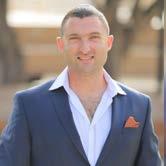

Looking

OU ISRAEL CENTER 27
Yitzchak Kowalsky 054-766-0338 Yitzchak@yykrealestate.com www.yykrealestate.com
Great Upper Level Family Cottage in the Ben-Azai Complex
Katamonim,
to invest for the future/family? In the new up & coming
Brand new project 2 buildings
Will be ready in 2026
Looking for the perfect family home in Baka at an affordable price? YYK Real Estate's got it! 4 bedrooms + Office space 2 full baths, 130 sqm, Sukka balcony, Private parking & storage Right around the corner from: Nitzanim Shul, Emek Refaim Hamesila Blvd & more Lease until 2077 EFRAT GET FIT WHILE YOU SIT: Exercise for ladies Join us on Sundays 12:45-1:30pm at the OU Israel Center Sura Faecher 0504153239
Great 3,4 bedrooms & PH Great payment terms All properties come with parking, Storage & Shabbos elevator
Serving as a Proper Guardian
In Parshat Mishpatim we encounter a myriad of laws relating to damages, as well as precepts relating to shomrim (guardians). The Torah dictates the level of responsibility one has when asked to watch over another’s items:
If a man gives his neighbor money or articles for safekeeping (Shemot 22:6).
Rav Yosef Dov Soloveitchik extends the intricacies of shomrim, that seemingly would be categorized as a mitzva ben adam l’chaveiro (between man and fellow man), as being pertinent as well to man’s overall perspective in his relationship with God. As we assert in Selichot ךלש ךוגהו ךל המשנה - the soul is Yours and the body is Yours. Man’s body and soul belong to God and are in a sense “deposited” with us. Therefore, as with deposits of personal property, the way in which we conduct ourselves must be in conformity with what our “Depositor” desires.

On Yom Kippur, man finds himself in a situation that is analogous to what the following pasuk describes when an item is missing:
(the homeowner shall approach the judges, [to swear] that he has not laid his hand upon his neighbor’s property). Man must convince God that he has not misappropriated the deposit –that man conducted himself in accordance with God’s directive. In Neila we recite:
– we should cease from misappropriating ourselves. Any transgression committed is essentially an act of larceny – theft from God.
There is a story that appears in the Yalkut Shimoni on Mishle that highlights this point. Rabbi Meir and his wife Beruriah were proud parents of twin boys who died of an illness on Shabbat. Beruriah did not want to inform her husband of the loss on Shabbat so as not to ruin his oneg Shabbat. After Havdalah, Beruriah informed Rav Meir of the loss by posing the following question to him. She asked: some time ago a certain man came and left two diamonds in my trust (pikadon), now he called for them. Shall I return them to him or not? Only after Rav Meir replied in the affirmative did Beruriah reveal to him the awful news.
The Rav explains that Beruriah understood that her children were a gift from God. However, when one deposits something with another and does not demand its return, after a while it seems like the depositor decided to leave the object with the other individual permanently. Yet, the
28 TORAH TIDBITS 1505 / MISHPATIM 5783
RABBI SHALOM ROSNER
Rav Kehilla, Nofei HaShemesh Maggid Shiur, Daf Yomi, OU.org Senior Ra"M, Kerem B'Yavneh
רֹמְׁשִל םיִלֵכ־ֹוֽא ףֶסֶּכ ּוה ֵעֵר־לֶא ׁשי ִא ןֵּתִי־יִּֽכ
אֹל־םִא םיקֹלֱאָֽה־לֶא תִיַּבַה־לַעַּֽב ב ַרְקִנְו ּוהֵֽעֵר תֶכא ֶלְמִּב ֹו דָי חַלָׁש
ןעמל ונידי קשועמ לדחנ
depositor has the absolute right to retrieve the object at any time.








We must comprehend that God gives many items for safekeeping (pikadon). It can be health, wealth, wisdom, children etc. We begin to think that these items are gifts and belong to us. Only later, and often under tragic circumstances do we come to understand that God does not give us these items outright, but they are entrusted to us for our safekeeping. If we guard them properly, God may enable us to keep them for longer. If we do not acknowledge God as the owner of the pikadon, He may come and claim them sooner.
When Yaakov Aveinu is left alone to contend with the angel, it is after he retraced his tracks to recover small vessels (pahim ketanim, Bereshit 32:25, Rashi). Was Yaakov so miserly that he was so concerned with seemingly non valuable objects? The Be’er Yosef explains that Yaakov believed that all his possessions were entrusted from God. Therefore, he could not forgo even the smallest item entrusted from God. That is why he sought to recover the small vessels.





Yaakov had the attitude of appreciating that every single item he owned was entrusted to him by God and so he had to care for it properly. All the more so, we ought to be careful in the manner in which we view our possessions, raise our children, and conduct our lives so that we constantly serve as loyal guardians.


Mazal Tov to Yossi & Leba Klavan and family on the engagement of their son
Eitan to Shir Zev of Modiin





OU ISRAEL CENTER 29
Distributed
Hechsharim & to order: www.MatzaMan.co.il hillel.leib@MatzaMan.co.il
Spelt, GF Gluten Free Oat Hand & Machine.
throughout Israel




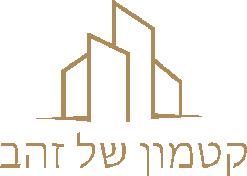
30 TORAH TIDBITS 1505 / MISHPATIM 5783
072.394.2557 FOR MORE DETAILS CALL DAVID:
COME AND JOIN OUR PRIME LOCATION BOUTIQUE PROJECT "KATAMON OF GOLD"
1-4 bedroom apartments built to a high standard, all with a Sukkah balcony and covered parking.
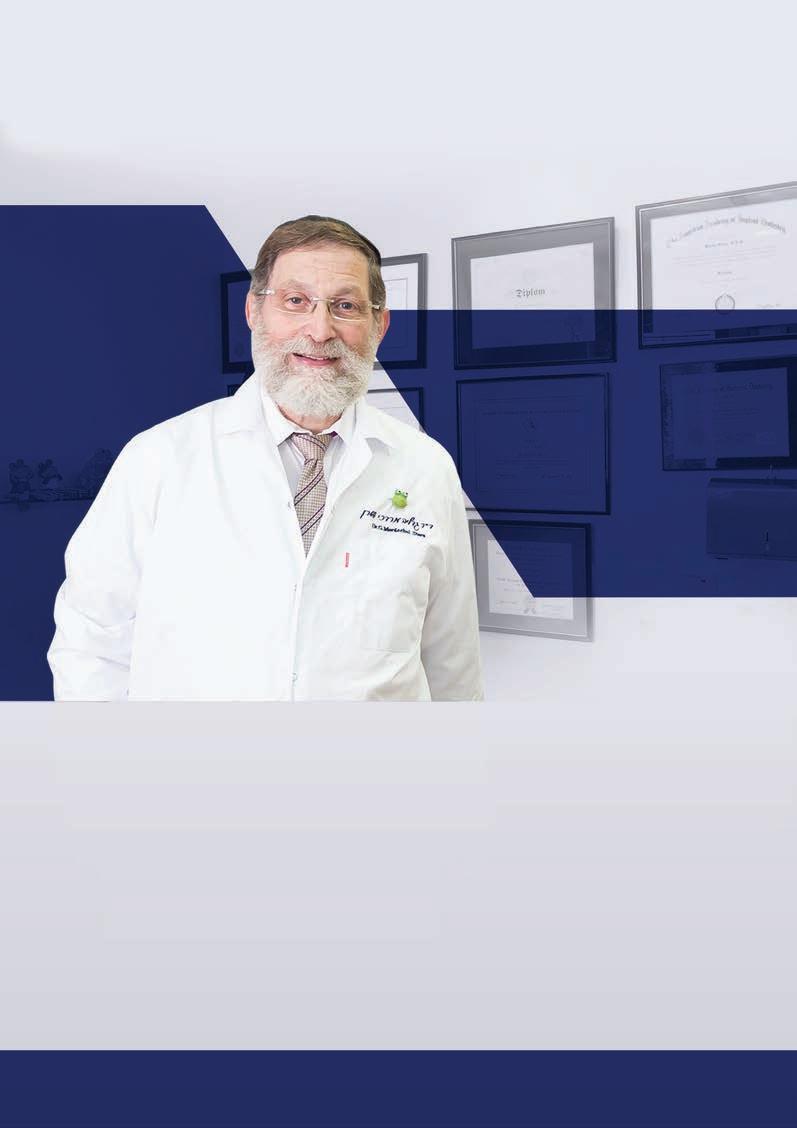
OU ISRAEL CENTER 31 Dr. Gedaliah Mordechai Stern STATE-OF-THE-ART
Implants Diplomate of Oral Implantology Teeth In An Hour Faster, Easier and Better than ever before. Bone grafts or sinus lifts Cutting and stitching Months without teethNot enough bone (These can usually be avoided today) Come and get a second opinion, if you were told you need: Almost always with less pain and less swelling, thanks to Lasers and Advanced Technologies. No-cost consult.No-cost x-rays (2D/3D) if have already, within last 6 months. implantsandlasers-r-us.com Ussishkin 57, Rechavia, Jerusalem 02-6258258
Dental
Mishpatim Metamorphosis
The Talmud (Baba Kamma 30a-b) teaches that a person must take great care in leaving sharp objects in places where they can cause damage or injury. For example, if a person builds his fence out of thorns or places shards of glass in a fence, he will be responsible for any injuries that take place. Rav Yehuda concludes this discussion by saying that someone who wants to become pious should take great care regarding the laws of nezikin, damages. Rava says that he should keep the rules enumerated in Masechet Avot, and some say he should keep the laws of Brachot. We can readily understand how learning Mesechet Avot and Brachot will help a person attain higher levels of piety, but how does learning the laws of damages affect one’s spiritual devotion?
Quality printing of Sifrei Kodesh

The Slonimer Rebbe in Netivot Shalom offers a few perspectives in response to this question. He quotes the teaching of the Maharal that a person can achieve wholeness in three main areas: bein adam lachaveiro, in his interpersonal relationships, bein adam laMakom, in his relationship with G-d, and bein adam le’atzmo, in his relationship with himself. He notes that the word “chasid” comes from the root “chessed,” lovingkindness. A pious person is one who’s whole nature is infused with the desire to do and share goodness. Such a person will take the greatest care not to harm the property, body or feelings of another. Learning the various details involved in the laws pertaining to damages develops a person’s awareness to live with a heightened sensitivity to protect what belongs to others, thus achieving wholeness bein adam lachavero. Further, learning Pirkei Avot develops one’s middot and a higher self-consciousness, bein adam le’atzmo. Finally, learning masechet Brachot develops a greater appreciation for Hashem’s everlasting bounty and benevolence, enhancing his growth bein adam laMakom.
On a more esoteric level, the Netivot
32 TORAH TIDBITS 1505 / MISHPATIM 5783 REBBETZIN SHIRA
SMILES Faculty, OU Israel Center
רואלהאצוהוסופדתוקפה
Specialists in hard and soft cover seforim. Premium print, binding and cover quality! Experienced team offering world class customer service and support! Orders from 300 copies or more. Delivery straight to your door! beit hadfus st. 30 Jerusalen.Israel office@yochai-print.com yochai-print.com +972-527151736 For Hebrew speakers call 972 -527158749 +
ONLY 29 MORE GLUING DAYS UNTIL PESACH
1898
2023
(10% off for the first 10 customers)*

15% off table refinishing & 10% off chair refinishing*

*Valid until February 23, 2023
**************** RESTORE YOUR FURNITURE TO HEALTH ****************
Website: www.thefurnituredoctor.co.il Email: office@thefurnituredoctor.co.il

Phone: 02-999-2418
WhatsApp: 058 787 3755
“Im when
tiness, the bor (pit) represents despair, mav’eh (man/teeth) represents the desire for physical pleasures, and hev’er (fire) represents passion. One who wants to become a chasid must be ready to work on these primary aspects to correct any “internal damages” that may lead him to sin.
Rav Yerucham Levovitz, in a classic piece in Da’at Torah, notes that learning the laws of damages and interpersonal relationships leads one to learn more deeply about himself. One can’t possibly understand the consequences or scope of damaging another’s property without first discerning his own sense of self, his values and convictions. We find a classic example in
you lend money to My people, to the poor Rashi expounds, “look at yourself as the poor person.” You can only lend money to another if you first step inside his shoes, feel the humiliation of knocking on doors, identify with the rejection and despair, get in touch with his desperation to retain his dignity. If one learns the laws of nezikin with an attitude of understanding and sensitivity to others, he will automatically become more refined and worthy of the title “chasid.”
Every person who was not born in Israel and lives in the Holy Land should celebrate his/her ALIYANNIVERSARY annually!
REMEMBER! WITH ALIYAH BLESSINGS! The NEAMANS
OU ISRAEL CENTER 33
HEAVY-DUTY TABLE SLIDES to strengthen weak tables & more than
RABBI JUDAH MISCHEL
Mashpiah, OU-NCSY Executive Director, Camp HASC Author of Baderech: Along the Path of Teshuva (Mosaica 2021)
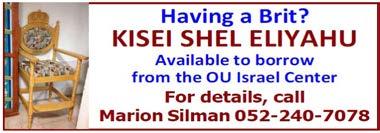
Dive In!
Rabbi Irving Levy was a wise and respected talmid chacham and businessman, who together with his wonderful wife, Shirley A”H, were legendary baalei chesed, and of the earliest founders of the Torah community in Monsey, New York. As the first chairman of the board of education of Hebrew Institute of Rockland County (HIRC), which was later rededicated and renamed ASHAR, he was directly responsible for children receiving a broad and balanced Torah education. Rabbi Levy could often be found with a Gemara and cigar in hand, dispensing advice, sharing a good vort or witticism.
Late one night, a young father and family man in the community, a new-ish baal teshuvah, knocked at the Levy’s door. Though well-read and educated, this Harvard graduate and analyst on Wall Street did not have the privilege of formal yeshivah education. He felt overwhelmed by his challenges in navigating the frum community day to day, and especially in terms of limmud haTorah. There was just so much to learn, and endless amounts to process.
Sitting down in the Rabbi Levy’s office, surrounded by countless well worn sefarim that the Rav had learned, he shrugged and asked with earnestness, “Where do I even start?”
Rabbi Levy puffed on his cigar, and smiled empathetically. “Torah is a vast ocean… just jump in and you’ll learn to swim!” Putting a reassuring arm around the young man, he then opened a Chumash and turned to Parshas Mishpatim. “Here, this is a great place to dive in. Come, let’s begin together; ready? V’eileh ha-mishpatim….”
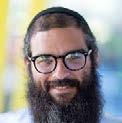
“And these are the laws that you shall place before them…” (21:1)
As a follow up to the awesome revelation at Sinai, our sedra introduces us to a broad cross section of civil laws and intricate halachic detail, forming the foundation of so many mitzvos bein adam la-chaveiro, laws that govern our interaction with one another.
Much of our Parsha finds elucidation in the Gemara; particularly in the tractates of Bava Kama and Bava Metzia. Laws of personal damages, borrowing and lending, damages and injury as well as financial structures and Torah economic policy are extrapolated from Parshas Mishpatim. In fact, after learning some Gemara, many a student in a yeshivah geared toward baalei teshuvah has jokingly exclaimed, “Parshas
34 TORAH TIDBITS 1505 / MISHPATIM 5783
םֶהיֵנְפִל םיִׂשָּת רֶׁשֲא םיִטָּפְׁשִּמַה הֶּלֵאְו
donated by Marion & Michael Silman Ita Rochel 02-560-9125
Mishpatim is basically the Kitzur Bava Kama!”
םיאלוממ היתותואו היקודיד רובידו רוביד לכ ןיב אבר אמיכ שישרתב
“Between every commandment and the next, were the details and the letters of the Torah written, ‘filled with turquoise like the Great Sea’.
(Talmud Yerushalmi, Sotah, 8:3)
Just as there are tiny waves between the great waves of the sea, so there are minute details found within the general laws of the Torah — innumerable teachings, each more precious than pure turquoise sapphire, conveyed by every stroke of every letter of every word.
In his beautiful introduction to Sefer Menoras haMa’or, Rebbe Yitzchak Abuhav, zy’a, of Tzfat compared the rich and beautiful teachings of the Gemara — the ‘Yam haTalmud’ — to “precious pearls that lie in the depths of the sea”. With more than fifty mitzvos that form the basis of a civil society, Parshas Mishpatim can indeed be seen as the beachfront of a vast ocean of Jewish life and learning.
This Shabbos is Mevarchim Chodesh Adar. The Me’or Einayim, Reb Mordechai, the Maggid of Chernobyl, zy’a, interprets the inner meaning of the word Adar: לש ופולא ,רד-ףלא רד םלוע, “Adar is spelled Alef-Dar, teaching us that the ‘Alufo’ shel Olam, the Master of the World, is dar, ‘dwelling’ within the natural events of this month. The miracles which we celebrate in this month are enclothed and revealed in the normal functioning of the physical world, even woven into the fabric of political drama. As a result, our celebration of Purim in this month is very much
within the physical world: mishteh v’simchah, drinking wine and feasting, giving gifts of food and money.
Furthermore, in advance of Rosh Chodesh Adar, we read Parshas Shekalim, narrating a collection of coins which went to the physical construction and upkeep of the Mishkan.
Directing our attention to the reality of Hashem’s Presence in this world, our sedra also enumerates agricultural laws, the festivals, as well as dietary laws. We are instructed to create a just culture and ensure fair treatment of foreigners and slaves. We are commanded to drive out the seven nations who inhabit Eretz C’naan, and are issued a warning regarding being influenced by their practices and values. The physical borders of Eretz Yisrael are also defined. The theme of the parsha is Alef Dar, ensuring a community, homeland and nation in which we can live a God-centered life and reveal Divinity through our everyday activities.
Parshas Mishpatim invites us to “dive in”, and immerse ourselves in the life-giving waters of Torah study. For myself and my family, this Shabbos is an opportune time to express our gratitude for Rabbi Levy zt’l’s advice to my father so many years ago. It is a day that we recommit ourselves to the extraordinary choices our parents made to live a life of observance and joyful engagement with Yidishkeit. And it is a day in which all of us are blessed to swim ever deeper into the vast ocean of Torah.
OU ISRAEL CENTER 35
Mazal Tov to Aytan & Rivki Himelstein on the birth of a granddaughter






36 TORAH TIDBITS 1505 / MISHPATIM 5783 YOUR ALIYAH FLIGHT FACILITATE • CELEBRATE • ADVOCATE • EDUCATE WORKING IN PARTNERSHIP TO BUILD A STRONGER ISRAEL THROUGH ALIYAH Got Aliyah questions? We've got answers! *3680 answers@nbn.org.il
LOGON presents




FOR SALE
MEKOR CHAIM - Close to the mesila park, large 4 rooms, 98m, Shabbat elevator, 2 balconies, good shape, master bedroom, quiet 3,590,000 NIS


CLOSE TO BAKA WITH GARDEN - Charming garden apartment, 4.5 rooms, 113m, private garden, 70m, no stairs, spacious, quiet, parking, exclusive 4,800,000 NIS
RECHAVIA WITH GARDEN - 5 rooms, 120m, garden, 140m, full of character, 20m building rights, 3 directions, quiet, for renovation, rare, exclusive
UNIQUE HOUSE IN
OLD
KATAMONGreat location, beautiful house on a plot of a dunam, huge garden, Arabic style, quiet, 2 parking spots, rare!
This amateur production of THE WIZARD OF OZ is presented by arrangement with Concord Theatricals Ltd. on behalf of Tams-Witmark LLC.www.concordtheatricals.co.uk THE WIZARD OF OZ By L. Frank Baum With Music and Lyrics by Harold Arlen and E. Y. Harburg Background Music by Herbert Stothart Dance and Vocal Arrangements by Peter Howard Orchestration by Larry Wilcox Adapted by John Kane for the Royal Shakespeare Company Based upon the Classic Motion Picture owned by Turner Entertainment Co. and distributed in all media by Warner Bros.
Director: Yaacov Amsellem, Musical Director: David Waldmann, Choreographer: Keshet Margolis-Stein, Costume Design: Einat Smulian Tickets: www.negevlightopera.com Contact us: negevlightopera@gmail.com | 08-6414081 Beer Sheva Mishkan 27/3 Eshkol Regional Hall 23/2 Ashkelon Heichal Hatarbut 1/3 Jerusalem Theatre 5/3 Netanya Matnas Ir Yamim 9/3 Ra’anana Yad Lebanim 12/3 Givatayim Theatre 14/3 Beit Shemesh Heichal Hatarbut 16/3 Modi’in Heichal Hatarbut 19/3 Rehovot Sela Auditorium 22/3 OU ISRAEL CENTER 59 www.ashleywilde.co.il • Curtains & draperies • Designer curtains • Venetian & Woven wood blinds • Blackout, Vertical, Roller, Roman & Pleated shades


38 TORAH TIDBITS 1505 / MISHPATIM 5783



OU ISRAEL CENTER 39

40 TORAH TIDBITS 1505 / MISHPATIM 5783
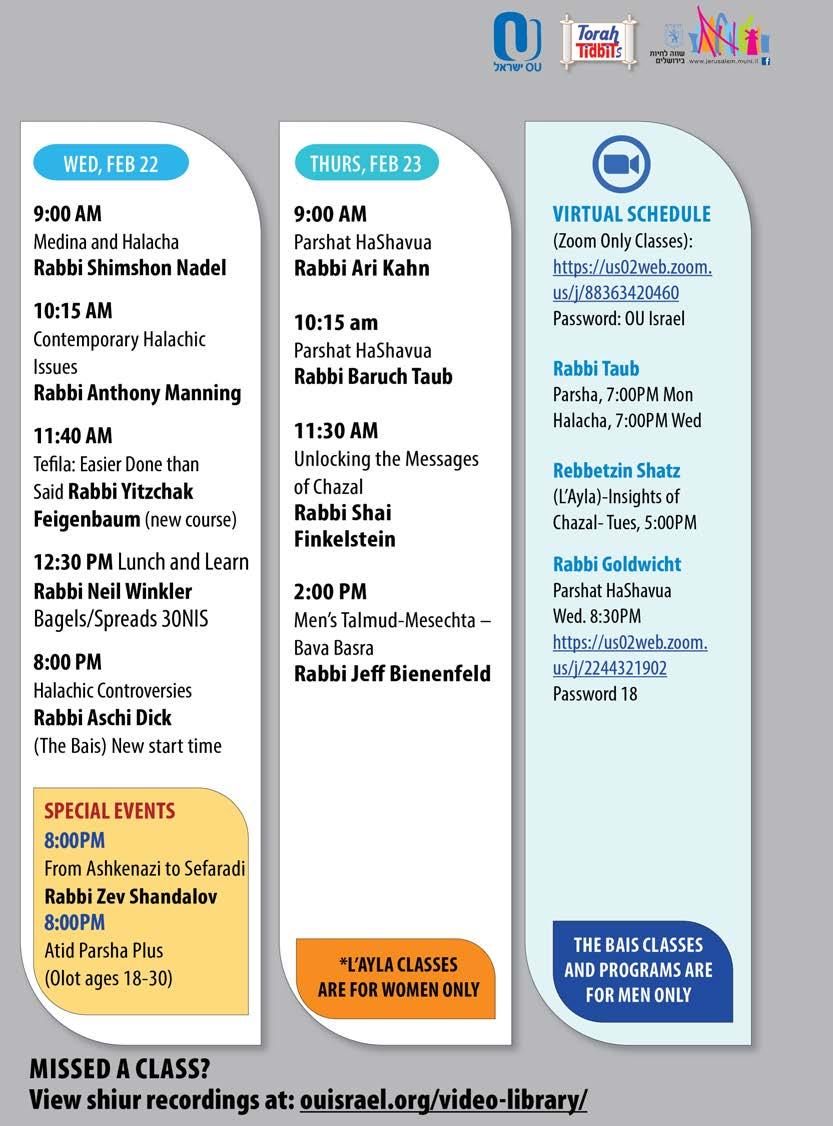
OU ISRAEL CENTER 41


42 TORAH TIDBITS 1505 / MISHPATIM 5783
DOROT - The OU Women's Intergenerational Choir

Director Hadassah Jacob 052-384-7230

Monday Evenings 7:00 - 9:00pm
PRI HADASH
WOMEN'S WRITING WORKSHOP AT THE OU ISRAEL CENTER

Monday mornings 10.30-12.30
For more details, call Ruth 02-628-7359 or Judy 054-569-0410
OU ISRAEL CENTER 43




44 TORAH TIDBITS 1505 / MISHPATIM 5783 Join OUr Purim Campaign Donate through our website www.ouisrael.org/purim Give Pre-Purim Mishloach Manot to heroic IDF soldiers, including OU Israel Youth Centers alumni Price: $18 / NIS 70 רעונה יזכרמ בלב םוקמ אתיירואד or scan the code Donations made to the OU Israel are tax deductible


OU ISRAEL CENTER 45


46 TORAH TIDBITS 1505 / MISHPATIM 5783



OU ISRAEL CENTER 47
WE OFFER A MIXED ENVIRONMENT FOR RELIGIOUS AND SECULAR, FOR NEW IMMIGRANTS AND NATIVE ISRAELIS

SOCIAL & CULTURAL ACTIVITIES
Nofei Yerushalayim has a variety of interesting social & cultural activities. Both in English and Hebrew
MEDICAL CARE
Nofei Yerushalayim provides residents with 24 hour medical care and supervision. There is also a nursing wing in the building
ENTRY PROGRAMS:
There are a number of options which are tailored to the needs and financial abilities of each potential resident: Monthly rental, Single Payment Entry Fee or Deposit
Come visit us or call for further information: 02-675-1311
48 TORAH TIDBITS 1505 / MISHPATIM 5783


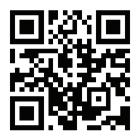

OU ISRAEL CENTER 49 Interest rates have risen, and so have ours! Make with Bemuna more then double what the banks are offering! 27 year track record Strong securities 3 year investment program 3 year Guaranteed returns Call our investment expert Moshe Ehrlich today to hear about our latest investment opportunities! Invest@bemuna.co.il www.bemuna.co.il 050-551-3221 הנומאב ריע הירומה A safe alternative for your investment funds! Invest with Invest with Bemuma today, and receive a guaranteed return! Looking for a stable and safe alternative for your funds? The stock market is plunging? Scan to visit our site A SELECTION OF OFF-MARKET PROPERTIES AVAILABLE IN EFRAT AND GUSH ETZION www.noamhomes.com Real Estate | Investments | Management services BS″D Scan to visit our site www.noamhomes.com Real Estate | Investments | Management services www.noamhomes.com | office@noamhomes.com Look for us: NOAM HOMES Noam Homes Even Sapir 24, Jerusalem 058-793-2222 2020 2021 From your friends at NOAM HOMES Real Estate Professionals The TOP 10 Real Estate Office in Jerusalem for 2020 & 2021 (MADLAN) HAPPY Passover NACHLAOT Great Investment Property, devided into 3 units! Beautiful duplex, built to a high standard! Lot with unique villa with Apartment Complex and private garden! Authentic 5.5 room Home with character and beauty! MALCHA NACHALAT ACHIM GERMAN COLONY Noam Homes Scan to visit our site Look for us: NOAM HOMES Noam Homes 24 Even Sapir St., Jerusalem 058-793-2222 office@noamhomes.com FOR MORE INFORMATION CALL NOA: 052-870-2387 Scan to WhatsApp Noa Noa Vasl Resident of Efrat
SIMCHAT SHMUEL
BY RABBI SAM SHOR Program Director, OU Israel Center

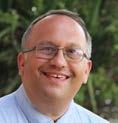
This Shabbat, we will read Parshat Shekalim, one of the four special parshiyot which link together the days of Adar-beginning this coming week with Rosh Chodesh Adar with the days of Nisan ,leading up to Pesach.
Each of these four special parshiyot, introduces us to important, eternally relevant messages.
Parshat Shekalim begins with these familiar verses:
This is what everyone who is entered in the records shall contribute; a half-shekel to the Mishkan by weight—twenty gerahs to the shekel—a half-shekel as an offering to Hashem.
Everyone who is entered in the records, from the age of twenty years of age and above, shall give an offering to Hashem:
The wealthy shall not pay more and the poor shall not pay less than half a shekel when giving the offering to Hashem as atonement for each of you.
The Chasidic Masters suggest many important messages inherent within this mitzva.
The Avodat Elazar, the Rebbe of Kozhnitz zy’a, points out that even one who has great wealth, must bring only the same
half shekel, as one who is impoverished, as if to teach each of us, that no matter our means, none of us is truly complete as an individual. We are only truly whole, when we join together with the rest of Klal Yisrael.
Taking this idea a step further, the Birkat Avraham ,the Rebbe of Slonim, zy’a points to a well known Talmudic teaching in Masechet Kiddushin 40b:
A person must always consider as if they are half meritorious and half liable. With one ‘maase mitzva,’ they bring themselves and the entire world to the side of merit...
The Birkat Avraham, explains that this gemara is teaching us the fundamental lesson of the mitzva of machatzit hashekel. The Rebbe explains, that not only are we as individuals only truly whole when we join together and contribute to the enterprise of the Mishkan, but in doing so, we are simultaneously reminded of the capability each and everyone of us has to be a conduit for good, to grow and improve as individuals, and that in so doing each one of us is also contributing metaphysically to the betterment of the entire world.
Yehi Ratzon, on this Shabbat Shekalim, may we find chizuk in these beautiful insights, and may we indeed merit together to continue to lift up the entire world through our mitzvot and maasim tovim.
Chodesh Tov!
50 TORAH TIDBITS 1505 / MISHPATIM 5783
• Checks: Make out to “Yesh Ezra” Send to: Yesh Ezra, POB 36156, Romema, Jerusalem
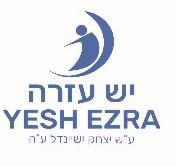

• Bank Transfer: Bank Mercantile (17), Branch 642, A/C 79747843, Yesh Ezra

• Credit card by phone: Sara at 077-820-0196 (Sun-Thu. 10:00am-3:00pm)
• Website: www.yeshezra.org Click on “Donate Now”
Inquiries: Menachem Persoff 050-570-1067 menpmp@gmail.com


OU ISRAEL CENTER 51
This week: Funds urgently needed for false teeth for elderly, sick man (the portion not covered by Kupat Cholim)
BY RABBI MOSHE TARAGIN R am, Yeshivat Har Etzion
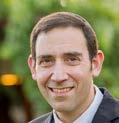
Mishpatim: The Renewed Covenant
Har Sinai was the ultimate moment of divine command. Hashem descended from heaven and delivered His will to a submissive human audience waiting on the mountain below. The midrash depicts Hashem hoisting the mountain above us, threatening that if we didn’t accept His Torah we would be buried alive. Har Sinai and the delivery of Torah were unilateral and hierarchical: Hashem commanded, and we obeyed, Hashem delivered, and we received.
Yet, at some point during the week of Har Sinai, we also joined Hashem in a mutual brit or covenant, mediated by Moshe. Twelve monuments were constructed, and sacrifices were offered. The blood from these sacrifices was divided, with half of the blood sprinkled either upon the people or upon their representative mizbeach. This symmetrical division of blood is characteristic of a bilateral covenant between two equal parties. Our earliest historical Covenant – the brit bein habetarim between Avraham and Hashem- was finalized by walking between evenly divided animals. Splitting animals or splitting blood evokes
a mutual covenant in which two counterparts agree to terms.
The Book
This Covenant of Sinai concludes with Moshe reading from a book called the רפס תירבה or the book of the covenant. The content of this book depends largely upon the chronology of this covenant. The Ramban asserts that this ceremony occurred the day after matan Torah, after several sections of Torah law had already been delivered to the broader population. The final section of parshat Yitro describes the post-matan Torah warnings against paganism. After being sternly warned against fashioning idols, we were immediately taught the moral and social laws of parshat Mishpatim. Together, these two sections formed a sefer habrit, which Moshe read the day after Har Sinai.
Two Pillars of Jewish Identity
Professing monotheism and modeling morality are the cornerstones of Jewish identity and form the foundation of the brit at Sinai. Ultimately, Hashem would forge a broader covenant surrounding general mitzvah observance: if we adhere to mitzvot we will be rewarded with prosperity in our Homeland of Israel. If we betray mitzvot we will be punished and exiled. This general covenant surrounding the entire roster of mitzvot would be stipulated in parshat Bechukotai and Ki Tavo, after the overall list of mitzvot have been commanded.
52 TORAH TIDBITS 1505 / MISHPATIM 5783 GEULAS YISRAEL
At Sinai, before delivering the full catalog of mitzvot, Hashem established a mini-brit founded upon two seminal elements of Jewish identity- theology and ethics. Though full halachic compliance is demanded of every Jew, Hashem knew that, sadly, throughout the fluctuations of Jewish history, many would veer from a fully obedient lifestyle. Unfortunately, in our modern world we have witnessed the majority of our people abandoning classic halachic behavior. The Sinai brit establishes a minimum baseline for Jewish identity. Even without full observance, belief in Hashem and moral behavior form the kernel of Judaism and Jews who uphold these pillars of Jewish identity are still engaged in a brit with Hashem. Thankfully most secular Jews, especially Israelis, though severed from full halachic compliance, still maintain this mini-brit, professing belief in Hashem and behaving morally.

Repeating the Covenant
Rashi disagrees and claims that this covenant ceremony occurred prior to Sinai. Even though the covenant is documented at the end of Mishpatim, chronologically, it occurred in the days leading up to Har Sinai. Given Rashi’s timeline, which places the covenant before Sinai, the sefer habrit could not possibly have contained mitzvot delivered afterward at Sinai. Evidently, the Sinai brit served an entirely different function.
Rashi claims that sefer habrit at Sinai reviewed the events of Breishit and Shemot, up until Sinai. The book retold the story of our Avot and their covenant with Hashem, as well as the saga of their descendants who were enslaved in Egypt and miraculously
OU ISRAEL CENTER 53
redeemed. The sefer habrit did contain a smattering of a few mitzvot which appear in Bereishit as well as selected trial mitzvot delivered at the Marah encampment a few weeks before Sinai. However, the dominant part of the sefer habrit, was not a list of mitzvot or commandments but a review of past Jewish history, centered upon the earlier covenant with our Avot.
Why were these stories repeated as part of the Sinai covenant? The Avot had already established a historical covenant with Hashem in Bereishit. What had changed to warrant a new brit based upon the same terms as the old brit?
National Covenant
Hashem wants our relationship with Him to be based upon our human interactions. Even though Hashem is different from us, we are expected to overlay human experience and human emotions onto our relationship with Him.
For this reason, our covenant with Hashem is based upon human covenants and more specifically, upon the most important human covenant, our marriage. Bereishit details the marriages of our Avot because they served as a template for their covenant with Hashem. The marital loyalty of our Avot stood in stark contrast to the sexual promiscuity of their surrounding societies. In these unrestrained cultures, desire for many women paralleled their obsession with many gods. Sexual lawlessness reflected theological infidelity. The
loyal marriages of our Avot symbolized their loyalty to a one G-d. Bereishit introduced the concept of a covenant between man and G-d built upon the model of marriage.
The Sinai brit proposes a bold new idea - that Hashem forms a covenant with an entire nation, and not just with individuals. A covenant between an entire people and a one G-d is unlike the covenant of marriage between two individuals. This updated form of covenant required a renewal of the brit of Bereishit.
Different Lifestyles
There is a second reason to update the covenant of Bereishit. In Bereishit we were tasked with representing Hashem in a world of theological confusion and moral mayhem. Courageously we spoke of a one God, responsible for all reality, whose moral will permeated our world. Though we broadcasted a new and different message, our lifestyle and culture were not dramatically different from that of our contemporaries. We had yet to be commanded in 613 mitzvot and our daily routine was roughly similar to that of our neighbors.
Though Chazal assert that the Avot fulfilled mitzvot, it isn’t entirely clear how detailed their mitzvah observance was. Even if they did perform all mitzvot, their behavior was optional and not mandatory and the experiential gap between Jew and non-Jew wasn’t sizable.
At Har Sinai mitzvot became normative and our lives would now be strictly regulated by a comprehensive system of divine laws. Our lifestyle and culture would become drastically different from that of

54 TORAH TIDBITS 1505 / MISHPATIM 5783
other nations. After Sinai we would not just model monotheism and morality but also would showcase the experience of commandments and religious commitment. We would not just become a chosen nation but also a different and separated nation. Mitzvot would ultimately compound the complexity of our historical mission. As a different nation, with a completely different culture regulated by mitzvot, we would often be subjected to suspicion and hatred. People are suspicious of the stranger, and we would always be the stranger.
As the dynamics of our historical mission of Bereishit were about to become more complicated, the brit of Bereishit was reinstated.
Historical Context of Torah
Not only does the delivery of Torah redistill the historical brit of Bereishit, but the brit of Bereishit serves as background and context for the delivery of Torah. We were chosen to receive the word of Hashem at Sinai because we had previously accepted the historical mission described in Bereishit. In a confused world we alone discovered Hashem and we alone agreed to the historical challenge of drawing him into an often-resistant world. For this reason, Hashem delivered His word to us at Sinai, so that we could better understand him and better represent Him in this world. The brit of Bereishit is repeated not only because the delivery of Torah updated the brit but because the brit of Bereishit provides the background for Sinai. Prior to receiving the Torah at Sinai, we were reminded of our grand historical mission of Bereishit. Without historical consciousness the Torah at Sinai would be incomplete.

1UniTravel - Medical Insurance at great prices Choose from multiple options 1unitravel.brokersnexus.com
1UniSim
Great Investment! 2 rooms, mirpeset & underground parking in new building under construction in a great location. Starting at 1.89m NIS/ 3 & 4 rooms also available.
Baka very close to Emek Refaim, 4 rooms, 82m in a tama 38 building. Elevator, mirpest & storage. Will be ready in 4 months. Amazing price of 2.99m shekel
For rent in Old Katamon - 4 rooms, renovated, ground floor, high ceilings, small garden, parking. 9000 shekel per month
OU ISRAEL CENTER 55
Soon? Travel with Confidence
Flying
REALTY 054-461-3943
- Sims for USA and Worldwide Starting at $40 sales@1unisim.com Call 077-400-3199 or USA 718-715-0001 NACHI
No check was kept on the men to whom the money was delivered to pay the workers; for they dealt honestly.
(Kings II 12:16)
In this week’s Haftorah, we read about Yehoash’s efforts to restore the Beit HaMikdash to its former glory. The building had fallen into a state of disrepair and needed to be renovated. Having been hidden in the Beit HaMikdash as a child, Yehoash dedicated his energy toward this campaign. The focus of the Maftir is the obligation on the part of the people to donate a half shekel to the Mishkan and later on, to the Beit HaMikdash while the Haftorah describes the receiving of the donations and how they were directed.
There are two sides of the fundraising coin - the personal side of obligation and commitment and at the same time, the communal side of creating trust and intention when collecting funds. The


juxtaposition of the Maftir and Haftorah suggest that community is built on a healthy dynamic between personal and public. The mitzvah of donating a halfshekel coin stresses the obligation for each person to invest in the Jewish people and national infrastructure. Each person is an important component of the community at large.
Building community is predicated on the people’s trust as demonstrated by the concluding Pesukim of the Haftorah. No one had to check the transfer of funds from the collection box to the workers.

No check was kept on the men to whom the money was delivered to pay the workers; for they dealt honestly.
These values, individual investment and public integrity, have been for millennia pillars of Jewish philanthropy. In order for us to continue successful support of communal projects both of these values must be nurtured in the hopes that we will soon have the opportunity to once again contribute half shekalim to a rebuilt Beit HaMikdash speedily in our days.
56 REBBETZIN DR. ADINA
םָדָי־לַע ףֶסֶּכַה־תֶא ּונְּתִי רֶׁשֲא םי ִׁשָנֲאָה־תֶא ּו בְּׁשַחְי אֹלְו ׃םיִֽׂשֹעםֵה הָנֻמֱאֶביִּכ הָכאָלְּמַהיֵׂשֹעְלת ֵתָל
SHMIDMAN
םָדָי־לַע ףֶסֶּכַה־תֶא ּו נְּתִי רֶׁשֲא םי ִׁשָנֲאָה־תֶא ּו בְּׁשַחְי אֹלְו ׃םיִֽׂשֹע םֵה ה ָנֻמֱאֶב י ִּכ ה ָכאָלְּמַה י ֵׂשֹעְל ת ֵתָל
Pesach & year round kitchen kashering 026431427
Rebbetzin Dr. Adina Shmidman is the founding director of the Orthodox Union Women’s Initiative and the rebbetzin of the Lower Merion Synagogue in Bala Cynwyd, PA.
UNITED HATZALAH

israelrescue.org/jlmmarathon23


OU ISRAEL CENTER 57
Editor, Torah Tidbits
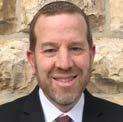
Every Mitzvah Embedded in the Land
The foundation of observing all of the mitzvot, from the standpoint of their inner significance and their objective, is only [authentic] in the Land (Eretz Chefetz 3:1).
The category of mitzvot known as Mitzvot Hateluyot Ba’aretz (‘laws which are dependent on the Land’), such as taking tithes and shemitta, are clearly rooted in the Land of Israel. Outside the Land of Israel such mitzvot are simply not relevant.
Strikingly, Rav Kook makes the bold assertion that every mitzvah, all 613, are also embedded in the Land of Israel. Rav Kook is not the first to make this suggestion. Indeed, this notion is championed by some of the most eminent of sages.
Rashi, commenting on a well known verse found in Kriat Shema (Devarim 11:18) writes: “Even after you will go into exile, be distinguished through performance of commandments; for example, put on tefillin and make mezuzot so that they should not be new to you when you will return.” Apparently, mitzvot in the main do not contain their full value when observed outside of the Land. Rashi states that we observe them only so that they will not be lost and
will be readily accessible upon the return to the Holy Land.
This same notion is echoed by the Ramban in numerous comments on the Torah. In his first statement on the topic he contends that Avraham, through his Divine inspiration, was able to intuit the Torah - however, Avraham only obeyed Torah law when he was situated in the Land of Israel. The first Jew, Avraham, perceived with ruach hakodesh that the laws of the Torah are associated with the Holy Land, and nowhere else.
Perhaps we can better understand the significance of the uniqueness of observing mitzvot in the Land by recognizing the premise that the Land of Israel was chosen by God as his home in this earthly world. The Ramban asserts that when the Torah uses the language, “God of Heaven and God of Land”, (Bereshit 24:3) it means to say that the Land of Israel is where God’s presence is most revealed. Elaborating on this idea the Ramban quotes the Talmudic dictum: “One who lives outside of Eretz Yisrael is as if he has no God” (Ketubot 110b).
In a similar vein, Rav Kook, in his classic work Shabbat Haaretz, opens his work with a verse from Tanach and a comment on the verse from the Zohar:
“Who is like Your people Israel, a unique nation on earth?” (2 Samuel 7:23)
‘“Who is like your people Israel, a unique nation on earth”. When they are united with the land, they are called a unique
58 TORAH TIDBITS 1505 / MISHPATIM 5783
RABBI AARON GOLDSCHEIDER
nation, but not when they are separate from it.’ (Zohar, Vayikra 93b)

In choosing this quotation from the Zohar, the classic work of Jewish mysticism, as the epigram for his book about the holiness of Land, and Shemittah in particular, Rav Kook suggests that the uniqueness of the Jewish people is fully manifested only when they are living on their land and practicing the laws that regulate life in harmony with the soil of Israel. (See The Sabbath of the Land, Sinclair, p. 50)
Along with Rashi and Ramban, Rabbeinu Bachya also advocated for the notion that every single mitzvah is rooted in the Land.
(Rabbeinu Bachya, Bereshit 26)
Rabbeinu Bachya proves this by pointing out that Torah’s description of the mitzvah of giving tzedaka be done in the Land. An obvious question: Tzedaka is
needed everywhere! Why does the Torah contextualize it within the framework of its observance in the Land?



Rabbeinu Bachya answers that Tzedaka is a prototypical mitzvah. While it may appear that its value is in its observance in every surrounding, in truth, its authentic fulfillment is assigned to only the Land of Israel. Only in the Land is every mitzvah of the Torah fully actualized.

OU ISRAEL CENTER 59
Dorot Rishonim 3, Jerusalem | 02-563-7155 | Web: SherlockSHats.com MENS AND WOMENS HATS/CAPS HAVE ARRIVED! TAKE 100 NIS OFF ANY BORSALINO HAT* Valid From February 17-26 *While supplies last Open Saturday Night 8PM-10PM; M 10AM-2PM Sun-Thurs: 10AM-8P ; Fri:
Real Life Rescues
EMT Saves 8-Month-Old Baby, Then Babysits Siblings
1221

In the middle of the night on Thursday, a family in Beit Shemesh received a terrifying wake-up call when their 8-month-old baby suffered a life-threatening allergic reaction. The parents immediately called for emergency assistance, and United Hatzalah volunteer EMT Zvi Oster was dispatched to the scene.

Zvi, a teacher by profession who lives two blocks away, was about to go to sleep after responding to three other emergencies in the past hour when the alert went off again on his communications device. The EMT arrived at the house in under three minutes and assessed the situation, determining that the baby was in a lifethreatening condition, presenting symptoms such as low blood pressure, high pulse rate, a swollen face, and difficulty breathing.
He was quickly joined by other first responders, including United Hatzalah volunteer EMT Akiva Geldenawer. The volunteers administered an EpiPen, a life-saving epinephrine injection device, to the baby. Within mere minutes, the child's swollen tongue and throat shrank, allowing her to breathe normally again, and her condition continued to improve progressively until the arrival of the ambulance.
The EMTs briefed the ambulance crew, and as the ambulance transported the baby to the hospital for further treatment together with both parents, Zvi remained to babysit the other children for half an hour until a different babysitting solution could be found.
After the incident, Zvi said, "I have volunteered with United Hatzalah for 9 years, and it is the most amazing feeling to help people when they have no one else to help them. When someone has a medical emergency, they're desperate for someone to help them. It's extremely rewarding to see the look in their eyes when they see the person with the orange vest arriving quickly and immediately. It lowers their level of anxiety which already begins a part of the healing process. In certain cases, such as this one, helping people also means watching the kids while the parents are at the hospital. Even though it's not technically my responsibility as an EMT, I am happy to do so. It is all part of the mission to help others."

60 TORAH TIDBITS 1505 / MISHPATIM 5783
Gilinski Real Estate


Your realtor in Jerusalem

Frustrated??
Let me know what property you are looking for – and I will find it for you!
Nahum Glatzer 050-7225694 gilinskirealestate@gmail.com
Orit Madar,Adv. Family Law and Mediation Divorce, Child support, Custody Inheritance & Wills
Yariv Madar, Adv. Bodily Injuries, Medical Malpractice Civil Litigation

10 Hillel St., Jerusalem | 36 Dam hamkabim st., Modiin 02-6255592, 050-3202909 Madar@netvision.net.il

OU ISRAEL CENTER 61
ENGLISH SPEAKING LAW FIRM
Making Up a Tefilla Missed to Help the Sick
Question: I spent all afternoon in the emergency room with my mother and did not daven Mincha. Can/should I daven a second Ma’ariv as tashlumin (makeup prayer)?
Answer: The gemara (Berachot 26a) introduces the idea of tashlumin for tefillot missed “by mistake.” Those who missed intentionally are excluded. Rishonim posit that there is tashlumin for one prevented from davening (see Shulchan Aruch, Orach Chayim 108:1). However, the Rosh (Shut 27:1, codified in Shulchan Aruch, Yoreh Deah 341:2) rules that an onen (one between the death and burial of a close relative, who is exempt from positive mitzvot) who missed a tefilla does not make it up at the next tefilla. He explains that the onen did not forget but was not obligated in the missed tefilla.
The Derisha (YD 341:3) extends this
RAV DANIEL MANN
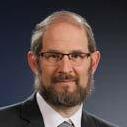
exclusion from tashlumin to exemptions from tefilla due to pressing involvement in a mitzva (osek b’mitzva). Caring for a mother with acute medical needs certainly qualifies (see Sukka 26a and Mishna Berura 640:7).The Taz (YD 341:5 & OC 108:1) takes issue with the Derisha, arguing that an onen’s exemption is qualitatively different from that of one involved in a mitzva. The Derisha and Taz may disagree on whether mitzvot erase obligations, like aninut does (see nuances in Kehilot Yaakov, Berachot 15; Atvan D’orayta 13). Alternatively, they may argue on the breadth of the institution of tashlumin.
Given that the Rosh regarding onen appears to be based more on logic than Talmudic precedent, it makes sense to distinguish between the cases. During aninut, one may not use windows of free time to do mitzvot. In contrast, our entire day should be filled with various mitzvot, yet we seem to almost always fit in davening with a (set) minyan (see Ishei Yisrael 22:9, who advises doctors and nurses to look for opportunities to daven). Therefore, it makes a lot of sense that even if a certain mitzva could not be interrupted, osek b’mitzva does not make it considered that the obligation of

62 TORAH TIDBITS 1505 / MISHPATIM 5783 FROM THE VIRTUAL DESK OF THE
OU VEBBE REBBE
תמשנ יוליעל ל"ז ןמצלז לאיזוע םהרבא ןב םירפא לאוי
A small Sefer Torah with its own Aron Kodesh is available to shiva houses or for any other necessary occasion on a temporary free-loan basis. If needed call Uri Hirsch 0545513173
The Orthodox Union - via its website - fields questions of all types in areas of kashrut, Jewish law and values. Some of them are answered by Eretz Hemdah, the Institute for Advanced Jewish Studies, Jerusalem, headed by Rav Yosef Carmel and Rav Moshe Ehrenreich, founded by HaRav Shaul Yisraeli zt”l, to prepare rabbanim and dayanim to serve the National Religious community in Israel and abroad. Ask the Rabbi is a joint venture of the OU, Yerushalayim Network, Eretz Hemdah... and OU Israel’s Torah Tidbits.
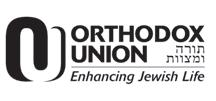

tefilla at that time did not exist. Nevertheless, the majority of Acharonim, including some of the most authoritative ones (Shach in Nekudot Hakesef, YD 341, Magen Avraham 93:5; Eliya Rabba 93:4; Mishna Berura 93:8), rule that one does not need to do tashlumin in a case of mitzva involvement.
That being said, it might be good to do tashlumin voluntarily, an idea we find even in the following cases when tashlumin is not prescribed: 1. He purposely did not daven; 2. More than one tefilla has gone by since he missed. Poskim encourage doing tashlumin as a nedava (voluntary tefilla). The possible proviso is that when the case is further away from warranted tashlumin, the nedava must be done with a chiddush, i.e., additions to his regular Shemoneh Esrei. The Shulchan Aruch requires chiddush regarding #2 (OC 108:5), but not regarding #1 (ibid. 7). Since the requirements of chiddush are not trivial and perhaps difficult (see Shulchan Aruch and Rama, OC 107:2), we would not recommend it for the average person.
Regarding an osek b’mitzva, the Pri Megadim (MZ 108:1) says it depends
whether the Taz’s opinion is strong enough to create a reasonable doubt whether tashlumin is needed; his inclination is not fully clear. It is an open question (see Yabia Omer IX, OC 90.6) whether there is an indication from the Rivash (140) like the Taz, and the Shevel Halevi (I:205) claims the Zohar supports the Taz. On the other hand, the Mishna Berura (108:2) rules that it requires a chiddush.
In your case, there could be reasons to require tashlumin. If your mitzva involvement began after the earliest time for Mincha, then according to almost all poskim, the subsequent exemption does not preclude tashlumin (Mishna Berura 71:4; the Birkei Yosef, YD 341:17 is equivocal). Also, while you had a right to err on the side of medical/kibbud eim caution and while one may use short breaks for ensuring his ability to continue the mitzva rather than tefilla (see Mishna Berura 71:13), if, in hindsight, you could have davened without compromising your mother’s care, tashlumin is called for.
OU ISRAEL CENTER 63 Having a dispute? For a Din Torah in English or Hebrew contact ‘Eretz Hemdah - Gazit’ Rabbinical Court: 077215-8-215 • fax: (02) 537-9626 beitdin@eretzhemdah.org
MASSAGE THERAPIST & FITNESS TRAINER 052.673.3704 I www.andyhealth.com | jerusalemmyhome@hotmail.com TUVIA ANDY HAAS BALANCE and FALL-PREVENTION SPECIALIST for OLDER ADULTS Maintain Healthy Bones and Muscles Decrease Stiffness and Joint Pain Increase Strength! Stay Independent!
TORAH VEHA'ARETZ INSTITUTE
 BY RABBI MOSHE BLOOM en.toraland.org.il
BY RABBI MOSHE BLOOM en.toraland.org.il
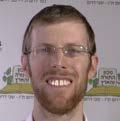
Shemitah Wine and Grape Juice – Otzar Beit Din of Rabbi Nissim Karelitz
In continuation of our series on holy wine and grape juice, we would like to present its new Sheva wine series, sweet sparkling Moscato wines, and grape juice by Zion Wineries.
Zion Wineries is situated in Ma’aleh Adumim and its grapes are from vineyards in Netofa and Gush Etzion, worked during the shemitah year under the supervision of Rabbi Nissim Karelitz’s otzar beit din. This otzar beit din has the most stringent shemitah guidelines, namely early pruning before the onset of the shemitah year to avoid pruning with a shinuy during shemitah itself. Zion Wineries sells all of its holy wines and grape juice in Israel only and the price covers expenses only.
Zion Winery’s Holy Products
Dry red wine: Blend of Merlot, Mourvèdre, Syrah, and Cabernet Sauvignon –13.5% alcohol.
Dry white wine: Blend of Chenin Blanc, and Roussanne – 12.7% alcohol.
Sweet red wine: Blend of Touriga, Grenache, Syrah, and Merlot – 11.5% alcohol
Sweet, sparkling Moscato: red and white, 5.5% alcohol. Wines are sold in boxes of 6 (750 mL) per box, all uncooked.
Red and white grape juice: 100% natural, uncooked, sold in boxes only, 9 bottles (1 L) per box.
Wine and grape juice distributors
Birkat Ha’adamah: All of the Zion winery products are now available through Birkat Ha’adamah, along with otzar beit din fruit from Otzar Ha’aretz and other products. They do home deliveries (for NIS 20) to Jerusalem, Beit Shemesh, Judea and Samaria, and many locations throughout Central Israel: www.braha.co.il/
Shenat Hasheva distributes Zion Winery products through organized deliveries. To organize a delivery in your location (min. order: 30 boxes), contact Yuval Tor: 050-720-7540. Shenat Hasheva also distributes

64 TORAH TIDBITS 1505 / MISHPATIM 5783
Rabbi Grodzinski taught that the “redeemed” individual does not ignore the prevalence of evil in the world but disdains it and confronts it wisely and successfully.
holy olive oil for NIS 140 for 5L containers.
Price: Birkat Ha’adamah and Shenat Hasheva charge NIS 110 per box (grape juice/wine).
Mishnat Yosef and Mechirah
Bakehilah: Mishnat Yosef delivers to distribution stations throughout Israel. Wine/grape juice products are only available twice a month (and not everything at once): mishnatyosef.org
And Rabbi Ziv, the Alter, gifted us with the insight that our relationship with the Almighty can be reciprocal. Yes, He is our Savior. But we can reciprocate His salvation by bringing honor to His name by acting ethically and honestly, even in the face of temptation.
Mechirah Bakehilah distributes in haredi areas only, on alternate weeks with Mishnat Yosef: www.sales.org.il/login.aspx.
Price: Mishnat Yosef and Mechirah Bakehilah charge NIS 99 per box, plus a NIS 5 fee for the delivery station.
As we draw ever closer to the Passover holiday, Chag HaPesach, we now have learned of no less than six paths to redemption, six paths to “seeing ourselves as if we personally were redeemed from Egypt.”
I’d like to thank Yuval Tor from Shenat Hasheva for the information and photos.

Which of the six will you choose as your path? Or will you try your hand at all six?

OU ISRAEL CENTER 65
OU ISRAEL CENTER 15 “redeemed” individual to our attention.
02-651-4030 www.eifermanrealty.com It’s never too late to file prior years’ tax returns! 02-999-2104 | 09-746-0623 | 03-527-3254 052-274-9999 Email: alan@ardcpa.com www.ardcpa.com Trusted US/Israeli tax services for over 30 years • U.S. Income Tax Returns • Israeli Tax Returns • Foreign Bank Reports (FBAR) • IRS Audit Representation • IRS Streamlined Program • Corporate Tax Planning • Estate and Trust Tax Planning • $1400 U.S. Child Credit • Investment Planning • Bookkeeping Services • Other Accounting Services ד“סב
BY SIVAN RAHAV-MEIR
On Unity, Working as an Emissary, and the Power of Women
Good morning from New York. Here are a few lessons I learned here at the annual gathering of the women emissaries of Chabad.
1. Unity is not a cliche. Particularly against a backdrop of internal strife in Israel, the outreach activity of 6,000 female Chabad emissaries throughout the world is significant. It is a testimony to the possibility of those who disagree finding common ground. The love for a fellow Jew and finding the good in everyone are essential components of living together in harmony, in recognizing that what we have in common is greater than what divides us.
2. Our mission is for all ages. In the front row, the most veteran emissaries, who will never retire, are seated. Behind them young mothers are seated with their babies who have just recently been born. No, there is no maternity leave for emissary mothers.
3. The power of women. The success of these emissaries is proof that a very public life is possible within the framework of traditional Jewish observance. On the
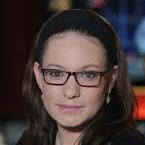
contrary, Torah and Chasidut and faith have given these women the strength to be a wife, a mother, and an activist, even in faraway places, initiating projects and building Jewish institutions from scratch.
4. We don’t see the whole picture. The thousands of smiles on the faces of the women in their group picture obscure the fact that their lives are far from perfect. I heard a lot about difficult challenges, loneliness, and homesickness. These women are not sorry about their chosen path, but those of us on the outside see only their successes and none of their struggles.
5. Everyone is a potential emissary. The goal of these emissaries is to make their work infectious: Even though we don’t appear in the emissaries’ picture, we all have the potential, wherever we are, to be one of them, to enrich the lives of others. We don’t have to take up residence in Kathmandu or Mexico, but only need to change how we look at and act upon those around us.
Thank you to the thousands of emissaries for the past few days. You have given me much food for thought.
66 TORAH TIDBITS 1505 / MISHPATIM 5783 THE DAILY PORTION

C M Y CM MY CY CMY K Chalutzim TD.pdf 1 2/12/23 3:01 PM
TOWARDS MEANINGFUL TEFILLA
BY REBBETZIN ZEMIRA OZAROWSKI Director of OU Israel L’Ayla Women’s Initiative


Conclusion of Birchat HaMazon
Rav Avraham Yitzchak Kook in his commentary on Tefilla, Olot Reiya, writes that the act of eating is one of the most physical/ materialistic acts there is and that food has the power to lower man to the point where he is focused only his personal animalistic pleasure. He explains that this is the very reason Chazal, based on the Torah commandment, instituted the Birchat Hamazon, which he calls the “עיגמ ושארו הצרא בצומה םלוס המימשה” , the ladder whose feet are on the floor but whose top reaches to the sky, and enables us to ללכה תוממור לא טרפה תולפשמ תולעל, to rise up from the lowness of the self-centered individual to the heights of the klal, the greater community. (Olot Reiya 1, p.362)
Over the past couple of months, we’ve explored the bentching, noting how we start off with a simple thank you for food, but then expand to many more lofty concepts including the past, present, and future, our goals as a nation, the need for the Beit HaMikdash, and gratitude for all the details Hashem takes care of for us in every situation.
As we reach the end of the bentching, we take advantage of this ןוצר תע to insert our own requests in the HaRachaman section.
Having climbed up the ladder and gone through the bentching process, we specifically choose requests that reflect the essence of the nation’s spiritual aspirations.
Our first set of HaRachamans focus on bringing recognition of Hashem to the world:
– דֶעָו
We request that Hashem’s Kindgom be revealed to all forever and ever.
We ask that Hashem’s Shechina bring blessing to the world, causing all those around to bless Him.
And we hope that Hashem will continue to be recognized and praised throughout the generations.
The next section of HaRachamans focus briefly on our individual needs, because if those aren’t taken care of, we can’t focus properly on our goals and mission as a nation:
We requests that Hashem grant us הסנרפ (job and sustenance) in a respectful way.
We ask that Hashem bring us bracha in our homes and on our tables.
We requests that Hashem bless our families. But even those personal requests are interspersed with our lofty communal requests:
68 TORAH TIDBITS 1505 / MISHPATIM 5783
םָלֹועְל ּוניֵלָע ְךֹלְמִי אּוה ןָמֲחַרָה
– ץֶרָאָבּו םִיַמָּׁשַּב ְךַרָּבְתִי אּוה ןָמֲחַרָה
- םיִרֹוּד רֹודְל חַּבַּתְׁשִי אּוה ןָמֲחַרָה
– דֹובָכְּב ּונֵסְנְרַפְי אּוה ןָמֲחַרָה
ןָחְלֻׁש לַעְו הֶּזַה תִיַּבַּב הָּבֻרְמ הָכָרְּב ּונָל חַלְׁשִי אּוה ןָמֲחַרָה – ויָלָע ּונְלַכָאֶׁש הֶז
תֶאְו יִעְרַזְו יִּתְׁשִאְו יִתֹוא ...יִרֹומ יִבָא תֶא ְךֵרָבְי אּוה ןָמֲחַרָה – יִל רֶׁשֲא לָּכ
ourselves that much closer to the ultimate purpose of the world.
We request that Hashem break the yoke on our necks so that we can walk with pride to (and in) our homeland.
Let us conclude our study of Birchat HaMazon with the powerful words of Rav Kook –
אוהש ,יטרפה ונוזמ ךרע ריכהל ילארשיה שיאל יואר"
We ask that Hashem send Eliyahu Hanavi with the good news that Mashiach is coming.
And finally, we put in a request for our ultimate goal – the bringing of Mashiach and Olam HaBa, which will ultimately lead to peace and harmony in the world “
”.
By going step by step from the biting and swallowing of food to the ultimate request for Mashiach, we have slowly moved up the ladder from the lowest point on the ground to the heights of Shamayim, bringing

“It is proper for a Jew to recognize the value of his individual portion of food. With each bite, he lays one additional stone in the building of a broader and more holy and sublime world. How greatly his soul should be lifted up in the knowledge that he is sitting at the table before Hashem” (Olot Reiya)
May we be zocheh to really focus on our bentching and to reach these great heights on a daily basis.
OU ISRAEL CENTER 69 ּונֵכיִלֹוי אּוהְו ּונֵראָּוַצ לַעֵמ ּונֵלֻע רֹּבְׁשִי אּוה ןָמֲחַרָה ּונֵצְרַאְל תּוּיִמְמֹוק –
רֶּׂשַביִו בֹוּטַל רּוכָז איִבָּנַה ּוהָּיִלֵא תֶא ּונָל חַלְׁשִי אּוה ןָמֲחַרָה – תֹומָחֶנְו תֹועּוׁשְי תֹובֹוט תֹורֹוׂשְּב ּונָל
–אָּבַה םָלֹועָה יֵּיַחְלּו ַחיִׁשָמַה תֹומיִל ּונֵּכַזְי אּוה ןָמֲחַרה
הֶׂשֲע לֵאָרְׂשִי לָּכ לַעְו ּוניֵלָע םֹולָׁש
שודק רתויהו יללכ רתויה םלועה ןינבב תחא ןבא הזב חינמ לע בשוי אוה יכ עדיו ושפנ םמורתת דאמ המו ,בגשנו .)הסש 'מע ,א היאר תלוע( "'ד ינפל רשא ןחלושה
Preventing Mistakes
Over the past few weeks several readers have expressed their horror and dismay when reading our columns dealing with the tragic and heart-wrenching case of baby Sofia, born to a couple who are not her genetic parents. Until the writing of this
SHIUR SPONSORS
Monday, February 20th - Rebbetzin Pearl Borow’s shiur is sponsored L’Ilui nishmat Edna Yachet bat R’ Avraham a”h by her daughter Malka
Rabbi Goldscheider’s shiur has been sponsored for the 2023 Academic Year
ל’’ז המלש ןב בוט םשו ה’’ע םהרבא תב םירמ תמשנ וליעל Rebbetzin Shira Smiles shiur is sponsored for the 2023 academic year by Dr. & Mrs. Menachem Marcus in memory of their parents, Rose & Dr. Emanuel Marcus z”l -
ל”ז סוקרמ השמ ןב יכדרמו ריאמ ףסוי תב לזייר Rosi and Ernest Strauss z”l -
ל”ז סוארטש דוד ןב לאינדו םהרבא תב דומיל
Rabbi Breitowitz’s Tuesday Shiur - Minchat Chinuch is sponsored for the academic year 2023 by Rabbi Refoel & Sharon Auman in memory of their parents Edith & Reiner Auman z”l
ד”יה לאפר תב ה”ע רתסאו ל”ז קודצ ןב הנוי and their son Rabbi Shmuel Eliyahu Auman z”l
י”נ לאפר ברה ןב ל”ז והילא לאומש ברה
Rabbi Goldin’s shiur is sponsored for the 2023 academic year by Dr. & Mrs. Menachem Marcus in memory of beloved aunts
Irma Haas a”h and Hilde Myer a”h
Rabbi Manning’s shiur has been sponsored for the 2023 academic year
ל’’ז ןמלק ןב גילזו ה’’ע תידנרב תב הנרב תמשנ יוליעל
Rabbi Taub’s weekly Thursday Parshat HaShavua Shiur is sponsored by The Jewish Legacy Foundation

passage the identity of the genetic parents remains unknown, with more than twenty couples currently seeking genetic testing to ascertain their parenthood of the child.
How could such calamities be prevented? Even with the best intentions of the fertility clinics and laboratories mistakes still happen. A recent meeting of fertility experts discussed how to prevent such mistakes, and the conclusion was that whatever they do there is still no guarantee that this will not happen again.
PUAH has been very concerned with such a possibility for several decades. The personal and halachic ramifications of such a mistake were the basis for our search for a solution. This led to the development of our supervision services.
PUAH has supervision of fertility treatment worldwide. The supervisors are incredibly dedicated and highly trained women who are present in the laboratory from early in the morning, sometimes until late at night.
Their task is to watch, observe and track the genetic material throughout the entire fertility procedure to ensure that such mistakes do not happen. This is both a halachic requirement and a personal need for assurance for the thousands of couples who undergo fertility treatment with PUAH supervision every year.
Knowing that someone is unobtrusively present in the lab, following their genetic
70 TORAH TIDBITS 1505 / MISHPATIM 5783
RABBI GIDEON WEITZMAN
Machon Puah for Fertility and Gynecology in Accordance with Halacha
material as it makes its journey through the various procedures and equipment, gives these couples the confidence to embark on fertility treatment, happy that such mistakes can be prevented.
The PUAH supervisors have discovered several dozen mistakes. These are rare, but, as we have seen, can be disastrous. In such cases either the mistake was rectified immediately, or genetic material was discarded and the treatment had to be performed again. While this is extremely difficult for the couple, the alternatives, of either having a child who is not their genetic child, or even living with the knowledge that such an eventuality is even remotely possible, may be infinitely worse.
PUAH is dedicated to helping couples navigate the system of fertility treatment and making sure that it is available for all couples who need it, without any halachic concern of the integrity of their lineage.

The Puah Institute is based in Jerusalem and helps couples from all over the world who are experiencing fertility problems. Offices in Jerusalem, New York, Los Angeles & Paris. Contact (Isr) 02-651-5050 (US) 718-336-0603 www.puahonline.org
URGENT TZEDAKAH APPEAL


for very ill, lonely widow woman with no family. Cancer survivor/ serious heart condition. Desperately needs money for basic needs/ medical expenses/place to live.
joanmarastern@gmail.com Phone 058-778-0691




Endorsed by: Rabbi Zev Leff/Rabbi Yaacov Hillel/ Rabbi Simcha Sheinberg/ Rebbetzin Dena Weinberg/Rabbi Yisrael Gans/Rabbi Dayan Dunner
Donations can be sent to: Rebbetzin Tzipporah Gottlieb-Heller, Neve Yerushalayim Seminary, 1 Beit Yitshak Street, Har Nof, Jerusalem 94130 or to Matat Mordechai Charity, Tax deductible Bank Mizrachi Tefachot. Bank 20. Branch 520, account 128764. Widows account 3649
OU ISRAEL CENTER 71
ISRAVILLA IS AVAILABLE FOR PESACH. ACCOMMODATES 50+, HEATED POOL, TOTALLY SECLUDED QUIET EXPANSIVE ESTATE.
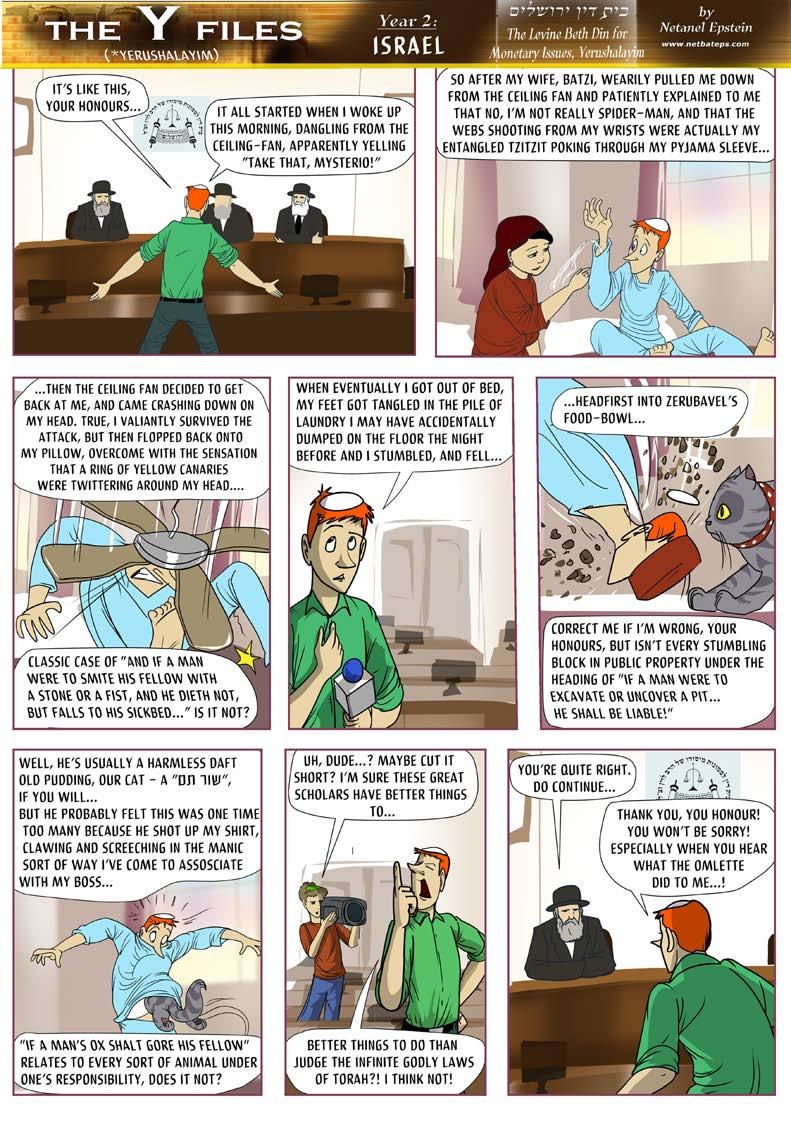
72 TORAH TIDBITS 1505 / MISHPATIM 5783

OU ISRAEL CENTER 73
DR. JACOB SOLOMON FROM THE SCHOOL OF THE RAMCHAL
 BY JACOB SOLOMON Contributer, Torah Tidbits
BY JACOB SOLOMON Contributer, Torah Tidbits
From The Ha’amek Davar
“You shall understand that G-d chastises you as a father chastises his son.” (8:5)
to their credit. They were celebrating the great privilege of meeting G-d in that way in joy, by eating and drinking.
the need for correction, the more severe the trial (though the truly wicked receive the reward for their few good deeds in this world, as G-d knows that they do not respond to correction).
They saw the G-d of Israel. Under His feet was the likeness of sapphire brickwork, resembling the essence of Heaven in purity. But He did not stretch out His hand towards the leaders of Israel. They perceived G-d, they ate and they drank (24:10-11).
The Ramban explains that in bringing up a child, the father looks to the child’s growth and future. Not spoiling them, but using firmness and even hardships on occasion, to prepare them for living as a responsible adult. To be able to deal with situations, and appreciate good rather than take it for granted. G-d did the same to the Israelites: He made them endure the hardships of living in the wilderness so that they may appreciate the resources, wealth, and pleasure of settling and living in the Land.
The final part of the Parasha is a narrative, bringing details of Matan Torah. The events include Israel’s accepting G-d’s Covenant and their declaration that “we will perform and listen to all that G-d says”. (24:7). When, straight afterwards, Mohe, Aharon, Nadav, Avihu, and the 70 elders of Israel ascended Mount Sinai, “they saw the G-d of Israel. Under his feet was the likeness of sapphire brickwork, resembling the essence of Heaven in purity.”
In addition, G-d’s being close to the individuals of Klal Yisrael as a father is to a son implies hasgacha peratit: that the trials that G-d imposes on individuals are for that person’s benefit, as a concerned father chastises his son. Indeed, the Ramchal (Derech Hashem: Providence 3) explains that part of hashgacha peratit are the trials one suffers, which are generally G-d-sent opportunities for spiritual growth. These experiences are designed to be specifically in line with the areas that the individual needs to improve on, as a father who wishes to promote the child’s growth. G-d’s trials to individuals may be in the form of wealth or in the form of suffering. Generally, the greater
Yet the leaders of Israel who accompanied Moshe Rabbeinu seemed to take it all in their stride. Vayechezu et Elokim, “they perceived G-d” or “they saw G-d”, and yet “they ate and they drank”. Rashi heads the commentaries that frown on them, taking the view that encountering the Shechina at such close quarters was not the time for eating and drinking. The Ramban leads the commentaries that take the opposite view:
The Ha’amek Davar, closer to Rashi, considers his understanding of lo shalach yado, up until now translated as “did not stretch out His hand” as having the following deep meaning. Not stretching out His hand means that G-d did not give support for those privileged to see Him in this way to appreciate what they were experiencing. They perceived, they saw G-d in sapphire blue image and yet He did not give them the means to absorb the spiritual aura. Thus that experience did not become part of them; they did not become chariots of the Shechina. It did not move them to such a degree that they could not eat and drink. That is the force of the words “they ate and drank”: the experience of G-d did not galvanize them onto a new plane of existence where earthly pleasures were not important. G-d had not put forward His hand to assist them to tune into and fully absorb the experience.
This picture has a parallel with today, when in Israel, and especially when in Jerusalem. Throughout the ages, today included, there have been individuals who have claimed to have arrived here in Israel only to feel a sharp anticlimax.
In addition, suffering for the righteous is very often a means of encouraging them to reach even greater heights, though it can be that they are bearing the misdeeds of a generation, or their afflictions fulfill a yetnot-understood niche in the wider eternal scheme of the Creation, or those people have reincarnated souls whose pain is in line with their conduct in previous lives. The Ramchal explains that though it seems that a righteous person’s torments in this world are out of line with his exemplary good conduct, all is redressed in the next world, where a person’s treatment is in strictly in line with his deeds and his true circumstances that are known only to G-d. In all these cases, G-d acts as a father concerned with his children: giving them what is needed now with an eye to their long term physical and spiritual future.
This level of hashgacha peratit, the Ramchal explains (Derech Hashem: Providence 4), is a privilege to Klal Yisrael. Their experience of willingly participating in the Revelation at Mount Sinai gave them the capacity to accept the Torah and its demands: “Moshe brought the people to meet G-d, and they positioned themselves
74 TORAH TIDBITS 1505 / MISHPATIM 5783
GUEST WRITER המלש האופר הקבר תב אגייפ הניר
Israel is Eretz HaKodesh, yet such feelings eluded them even when standing at the Kotel. Perhaps that is what those visiting and those living in Israel should pray for. That not only should they be able to be in Israel, but that G-d should give His help for them to tune into and appreciate the higher plane of existence that comes with being in Eretz HaKedosha and Ir Kedosha Yerushalayim.
המלש האופר

• Miriam Tovah Chaya bat




Chanah Elisheva Rivka
•Yosef Ezriel ben Chaya Michal
• Yisrael Leib ben Chana




OU ISRAEL CENTER 75
Hillel -052-5955-492 M Men achem -052-5955-073 Real Estate Brokerage Property Management (Maintenance & LT rental) Project Management (Renovations & Construction) ALL YOUR UNDER ONE ROOF! ErusalEm HomEs The Mendlowitz Family business with over 40 yearsof experience in the US and Israel! ...
הלחמ ןב
• רתסא ןב המלש • לזייר הניס ןב ץרה ילתפנ • הכרב הנח ןב השנמ םהרבא •
ןתנוהי
• Esther Fruma bat Baila
Benjamin Zatman Campus: IDC/Herzliya
Hometown: Silver Spring, Maryland, USA
In parshat Mishpatim we have many details about the laws that are derived from the 10 commandments read one week prior in parshat Yitro. Why do we need the details and the 10 commandments? If we just had the details, couldn’t we figure out the 10 commandments from them? And visa versa, if we just had the 10 commandments, couldn’t we learn all the details from them?

I remember an answer my Rabbi, Rav Shlomo Chayen, told me. He said that at the time in parshat Mishpatim and even now, Am Yisrael is building up a community and a nation. A nation that is built up on a vision which consists of goals and a purpose, that’s what the 10 commandments were: the vision for a world that treats each other with respect, keeps Shabbat, doesn’t lie, etc., but how does this vision translate in the day to day? How does one treat each other with respect? How do you build a healthy community?

These are the details we are given in parshat Mishpatim. To build a community it
can’t just be a vision and goals, rather you also need all the details to get you towards meeting your goals. A perfect example of this is our community here in Herzliya.
Not too many years ago a few individuals had a vision of a young anglo religious community here. They had dreams of this community growing into having 200 people at Kabbalat Shabbat, daily shiurim and events, and being a stepping stone for people to start their lives here in Israel. But how were they going to accomplish this goal? They set precedents of day to day values. For example: always make sure everyone has a meal for Shabbat, make sure to be there for each other, always encourage others to be the best version of themselves, and many more. Fast forward to today, with thanks to JLIC, I am proud to say the vision of these pioneers has come to fruition, and new visions are being developed to help our community grow to the next stage. May we all have the blessing that me and my peers have in Herzliya,
On HaPalmach - great 4 room apartment, 92m plus large garden in use, exclusive. Asking 4.95 million NIS

Palmach - 4 rooms, beautiful, 105m, porch, 2 parking spots, machsan, asking 6.1million NIS Smadar 050-3114040 // 02-642-4329
smadi_bida@walla.co.il
76 TORAH TIDBITS 1505 / MISHPATIM 5783
OU-JLIC
Orthodox Union Heshe and Harriet Seif Jewish Learning Initiative on Campus
המלש האופר האל היח ןב םייח עשוהי
and be part of a thriving community and may we take day by day steps to reach the goals of not just our hometown communities, but of Am Yisrael as a whole. Shabbat Shalom!

The OU’s Jewish Learning Initiative on Campus (JLIC) is creating and nurturing vibrant religious communities in Israel to support English-speaking college students and young professionals. JLIC Israel’s goals include: building a warm and welcoming Jewish community for students and young professionals; providing engaging and dynamic Jewish education; providing a supportive home environment for Olim; providing resources for personal and religious growth, including personal mentoring, Aliyah support, religious guidance and leadership development. Current JLIC programs in Israel include: Reichman University - Herzliya; Bar Ilan University - Givat Shmuel; Tel Aviv University; Tel Aviv for Young Professionals; and Jerusalem.
Contact: Rabbi Jonathan Shulman, Director of OU-JLIC in Israel shulmanj@ou.org



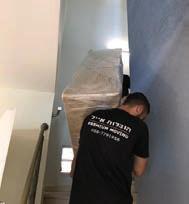
OU ISRAEL CENTER 77
Premiummoving.co.il 053-7272-815 PREMIUM MOVING & STORAGE ד"סב 054-527-9356 DIRTY AIR, DAMP & MOLD GREEN TREATMENT EXPERTS - Corona Cleaning - Deodorization - Leak Detection Systems - Waterproofing - English + Hebrew Reports - Working at heights - Insured - Quality House Painting QUICK ESTIMATE/FREE ADVICE :)
TORAH 4 TEENS
BY TEENS NCSY ISRAEL


Rose Schwartz Gush Etzion Chapter Director A Bull, A Donkey, A Lamb, Oh My!


Mishpatim picks up right after one of the most impactful spiritual moments in Jewish history with Moshe going over a series of seemingly mundane Halachot. One example of this can be found in Shemot 22:8—“For any sinful word, for a bull, for a donkey, for a lamb, for a garment, for any lost article, concerning which he will say that this is it, the plea of both parties shall come to the judges.”
How can this Halacha strengthen Beni Yisroael’s bond with HaShem after they just experienced one of the greatest spiritual moments on Har Sinai?
This pasuk uses the word “Elokim” in order to describe the role of the Judge. Reb Noson of Breslov asks why here does the Torah choose to write “Elokim” over “Dayan”?
The Torah chooses here to describe physical objects as coming under the jurisdiction of “Elokim” in order to teach us that everything in this world contains certain aspects of Godliness— “Elokut”. HaShem brings the physical into existence, and the Godliness he imparts within the objects are what give them their purpose along the way.
Once people turn to courts to settle their disputes about their physical objects, the pasuk is coming to teach us that no matter what the judge decides at the end of the day our physical belongings and comforts really come from and belong to HaShem. This pasuk enables Bnei Yisrael to raise the physicality of the world to a spiritual level, following the spiritual high of Matan Torah.
Aliyah Derfler 11th Grade, Neve Daniel
Explanations on Naaseh V’nishmah
What do the words, “naaseh v’nishma” mean? “Naaseh” literally means “we will do.” “Nishma” could mean “we will hear”, “we will obey”, or “we will understand.”
The Talmud and Rashi say the phrase means “we will do and we will hear.” That is, the Jews were saying that they totally believed in Hashem, and so they agreed to do His will even before hearing what it was. The Sforno explains one reason why they would agree without knowing more: he says the Jews’ statement is two words representing one idea: the Jews were saying they would do what Hashem asked simply because they wanted to be connected to Him and hear more from Him.
However, reading the events in order,
78 TORAH TIDBITS 1505 / MISHPATIM 5783
Bnei Yisrael said “naaseh v’nishma” after they had already heard part of the Torah. With this in mind, the Rashbam says that the simple meaning of the phrase, “naaseh v’nishma” is: we will do what we have already been commanded, and we will obey future commandments. This may suggest that Bnei Israel were willing to accept commandments only after knowing that Hashem had given them
Be’er Tziporah a"h - Bottled Water Gemach
Walking down King George St. in Jerusalem and want a cold bottle of water?
Come help yourself to a bottle at 52 King George.
In loving memory of Yoni’s wife
Tziporah a"h, a true Eishes Chayil, always full of chessed, kindness and laughter, and brought life and strength to so many people, that she touched! She was like Aron, who loved peace and pursued peace.

Yoni thanks Hashem for having the opportunity of having Tziporah in his life, to learn of her caring, patience and happiness, to overcome her challenges. May Tziporah's Neshama be a light onto the world, in a time of darkness, and may her Neshama shine to Gan Eden. Yoni misses Tziporah with tears in his eyes, as Hashem gave him a gift, a crown jewel, now he returns her to Hashem. With thanks and Toda. Love, Yoni
To help refill the supplysend tax deductible donations for Be’er Tziporah a"h Bottled Water Gemach
to Chabad of RechaviaRabbi Yisroel Goldberg email
Rabbi@JerusalemChabad.org

02 800-1717

www.JerusalermChabad.org/DonateShekels
and not simply because Moshe told them that Hashem commanded something new.
One last view is that “naaseh v’nishma” means “we will do and we will understand.” When Bnei Yisrael said they will do before they understand, they were conveying an understanding of a fact about life. We sometimes only understand something by doing it. Like the saying, ‘don’t judge someone before you walk in their shoes.’ We only understand music by listening, we only understand leading by being a leader, and we only understand teaching by being a teacher. It’s the same story with Judaism. We only actually understand Torah by following the commandments. Doing leads to understanding.
Shabbat Shalom!
OU ISRAEL CENTER 79
בוט יכ 'הל ודוה
Beit Knesset Hanassi









































 BY RABBI SHMUEL GOLDIN Faculty, OU Israel Rabbi Emeritus, Congregation Ahavath Torah, Englewood NJ
BY RABBI SHMUEL GOLDIN Faculty, OU Israel Rabbi Emeritus, Congregation Ahavath Torah, Englewood NJ


















































































































































 BY RABBI MOSHE BLOOM en.toraland.org.il
BY RABBI MOSHE BLOOM en.toraland.org.il



















 BY JACOB SOLOMON Contributer, Torah Tidbits
BY JACOB SOLOMON Contributer, Torah Tidbits






















